#when i first got into japanese culture and started learning the language in 2000
Text
Y'ALL I JUST SAW THE TRAILER FOR THE SERIES REMAKE OF SHOGUN AND SANADA HIROYUKI IS PLAYING TORANAGA
EVERYBODY SHUT UP I HAVE A REASON TO LIVE UNTIL FEBRUARY NOW
#when i first got into japanese culture and started learning the language in 2000#my momma was like oh i should see if i can get shogun for you#and she DID#she borrowed the entire uncut 8hr miniseries on VHS for me#and 15yo tea binged that shit in two days#(would have one but mom made me stop bc she said it wasnt healthy to sit in front of the tv for that long)#so to see a remake now is SCREAMING FLAILING BITING so fucking dope#BUT MOREOVER??? SANADA SAMA????#YES. WINNING. THANK YOU. BEST NEWS ALL DAY#toranaga was originally played by the original tasty daddy of japan mifune toshiro#so sanada is absolutely a BOMB ASS SUCCESSOR TO THE ROLE#IN THE YEAR OF OUR LORD 2024 TORANAGA SAMA WILL RETURN WITH ANJIN SAN#lies on the floor and cries#dont touch me i am so happy
4 notes
·
View notes
Photo

We have a new citizen in Mount Phoenix:
Mitsuka Yamamoto, who is known by no other name,
a 21 year old daughter of Tsukiyomi.
She is a designer at For the Fairest
and a hotline volunteer at Bohdisattva.
FC NAME/GROUP: Yu Jimin – Karina / aespa
CHARACTER NAME: Mitsuka Yamamoto
AGE/DATE OF BIRTH: April 11, 2000
PLACE OF BIRTH: Chiba City, Chiba Prefecture, Kanto region, Honshu, Japan
OCCUPATION: designer at For the Fairest, hotline volunteer at Bohdisattva Counseling Center
HEIGHT: 1.67m
DEFINING FEATURES:
A beauty mark on the left side of her chin, under her lips’ left corner
Big, almond shape, sharp eyes; shiny long hair, lips with a rounded Cupid’s bow
PERSONALITY: Mitsuka is, first and foremost a sensitive, creature. She’s compassionate, empathetic, and openly affectionate to almost all living beings, probably except for cockroaches and rats. Most of the time, she’s the mom friend in the group who takes delight in taking care of others, showering them with compliments, and being there when the time is rough. Once she deems someone is worth her time and attention, she will be the ride-or-die type of companion, and they can rest assured that no force in the world could shake her commitment for them.
An artist at heart, Mitsuka is highly creative and self-motivated. She never hesitates to express her avant-garde ideas, also constantly encourages others to express themselves freely. While appearing to be wild and eccentric at times, she’s exceptionally good at reading people and is quick to set boundaries, mostly to protect herself from potential evil intents. She’s got the same protective energy around the people she cares for, for one of her worst nightmares is seeing others in pain or danger without being able to help them out.
This Japanese demigoddess does not like to be ordered around and will give intense responses both physically and mentally if forced. Not fonding of any sort of confrontations, she will avoid getting into arguments or any form of conflicts at all costs. If she is hurt, Mitsuka tends to withdraw and keep silent rather than directly verbalizing her feelings. In extreme cases, she will forget the person’s existence rather than waiting for any apologies. Having said that, when she’s forced to fight, she can be formidable.
HISTORY: TW: mention of death
“It’s the night of a full moon, when I met your father, under a wisteria tree.” Miyoung smiled gently as she looked at Mitsuka, her eldest daughter, who was sitting across from her with eyes wide open in doubt.
“But you said you met dad at an international conference?”
Miyoung shook her head, her tender smile was intact, although there was a louder command for her daughter’s attention implied in her voice. “We’re not talking about your elder brother’s dad, Mitsuka.”
To the twenty-one-year-old Mitsuka, nothing could hold a candle to Paris in summer, when the city’s beauty is at its peak, and life is just an ethereal painting of happiness. At first, it looked intimidating, how perfect everyone and everything in this city of lights, love, and fashion appeared to be. But at the end of the day, its glamourous culture and historical legacies are why she left Japan, despite her father’s deep disappointment and her mother’s great worries.
Being born and brought up in Chiba city, Mitsuka was a rather normal kid. Her family wasn’t the wealthiest in their neighborhood, but they had a two-story private house with a garage and a lovely garden in a high-security residential area, and it only took about half an hour driving to her father’s brewery located in Tokyo.
Her mother, Lee Miyoung, had traveled back and forth between Korea and Japan for her marketing business. She met Mr. Suda Yamamoto at a business conference, and he asked for her mother’s hand while she was in her third month of pregnancy, a year after his first wife’s death. Unlike most of her friends and their fathers, Mitsuka and hers had never truly got along. She didn’t remember receiving much affection or attention from him, partly because he was indeed busy all the time, and probably because she preferred to stay in her own world.
Makoto, her father’s only son from his first marriage, had always been the superstar in the family. Even though she couldn’t help but envying Makoto sometimes, she quite liked him because of his patience and kindness. Sadly, they couldn’t spend much time together, for Makoto’s study and extracurricular schedules were crazily hectic, and he usually looked exactly like their father whenever he came home after work, totally exhausted.
One night, Makoto stopped coming home. A drunk driver took his life away, when it was only one month before the national university entrance exam took place. For an eight-year-old girl, seeing her father bawling his eyes out next to her brother’s coffin was terrifying. It was also the only time she saw her father cried. After that, she rarely saw any signs of emotions on his face but occasional frowns.
Mitsuka’s adolescence was generally peaceful, except for throwing fists at some bullies at school from time to time, and constant confrontations with her father about her dream of being a fashion designer.
“He’s just afraid that you won’t be able to make a living with that job,” Miyoung explained to Mitsuka the reason behind her father’s vehement opposition to her wish, to which Mitsuka replied without a second of hesitation.
“He’s just afraid that no one will take care of his brewery,” she corrected her mother, for the first and only time in her whole eighteen years of life. “And designing is not just a job, it’s my passion, mom. It’s what I’m living for.”
Since her pre-teen years, Mitsuka had already learned to make clothes, starting from the clothing for Mini, her family’s cat. Her targets soon expanded to small accessories such as scarves and handkerchiefs for herself and her friends, and at the age of sixteen, she started her small business of making cosplay costumes and cosplay makeup for local clients. It was still a humble start compared to some other starlets in the industry, but fortunately, it was enough for her to win a scholarship to study fashion designing in Paris.
Due to her younger brother’s devastating case, her parents were adamant that she should never dream of going to Paris, or even out of the town without their permission. Mitsuka, for the only time in her life, told her parents a great lie, that she would be obedient enough to give up the scholarship, stay in Chiba, and try to get to the business major that her father wanted her to study. Meanwhile, she secretly packed her bags. Then, in one late evening, with the help of some of her close friends, she secretly fled to the airport and took her flight to Paris, leaving a long apologizing note to her parents.
The moment she landed in France’s capital, her phone blew up with texts and calls and voice mails from her parents, especially from her mother. The next thing she knew was her mother barged into her dormitory and almost flooded her room with tears and begs for her to come back.
After hours of comforting and persuading and finally threatening, Mitsuka managed to stay. However, from the moment she sent her mother off back to Japan, she couldn’t go through a day without picking up her mother’s calls or at least answering her messages, which turned out to be her best remedy to cope with the pressure of living alone in a big city whose language and culture she was so fascinated but still very much a stranger to.
Three years of hardship has proved to be fruitful. She earned the degree with flying colors and a thought-out plan for the next steps. Her mother, being the best mother on earth, took a long flight to have a cozy celebration dinner with her dear daughter. But besides celebrating her daughter’s graduation, Miyoung had another reason to pick a quiet, rather seclusive restaurant for them this time.
“I guess now is the best time to let you know the truth,” Miyoung looked into her daughter’s sparkling eyes, smiling a woman whose biggest secret is finally revealed. From that expression, Mitsuka dared to guess that whatever her mother was about to say, it was going to be ultimately important.
“Mitsuka, you’re not Suda Yamamoto’s biological daughter. Your father is Tsukuyomi-no-Mikoto, the moon god, and that means you are a moon demigoddess.”
“...”
“...”
“Okay, I am… WHAT?!?”
---
[ So that’s why I’m here, in Mount Phoenix. ]
Mitsuka finishes her diary entry with a small drawing of a phoenix’s figure below the final sentence. As she reads the long pages again, Mitsuka still hardly believes what is written is true, that she’s a child of Tsukuyomi the moon god, and that said moon god is right here on the island, in a human vessel, probably isn’t aware of her existence at all. But again, she’s indeed allowed to access the island as a Japanese demigoddess, has just done cleaning up and decorating her apartment, and has got accepted to work at two jobs – one for her dream and one for her hobby. Things sound even better than the best life she’s dreamt of in Paris.
[ But we will see. ]
PANTHEON: Japanese
CHILD OF: Tsukuyomi
POWERS:
Lunar Solidification: She’s able to solidify moonlight into tangible items of her wish, from a hairpin to a sword. The quality and object lifetime is depended on how much energy and concentration she’s spent on creating them.
Lunar Empowerment: Her moods and physical health are influenced by the moon cycle, as she will be more lively and physically stronger when getting in contact with moonlight, and will be exceptional jovial, even hyperactive, during full moon periods.
Lunar Healing: She’s able to heal herself and others using the moon’s energy. She can only perform this power at full moon nights.
STRENGTHS:
She’s selfless and she has a penchant for spreading her love, attention, and care around, even to strangers and stray animals.
She can read people well, and often uses what she’s learned for self-protection and self-adjustment rather than attacking others.
A feisty lady, she knows what she wants and how to gets it, mostly in the most peaceful way possible.
She has a good aesthetic sense and a gift for visual arts, so she’s willing to help beautify almost everything around her, sometimes even without being asked.
WEAKNESSES:
She can get hurt quite easily if she deems her love and care are rejected. At such times, she tends to withdraw to her shell and sulk rather than communicating directly.
Her moods can and will change in a matter of seconds; she’s learning to control her emotions better
She tends to have emotional outbursts, or nervous breakdowns from time to time, especially during New moon periods.
It’s easy for her to feel lonely, and she intends to get attached to people, animals, places, or anything she likes quite fast
5 notes
·
View notes
Text
The 2000 Most Common Words in Japanese
[Trigger Warning: mention of struggles with ADD/ADHD]
Finally got a bit of break from my thesis. 😩 Honestly, it's been a hell of a ride. I love research, so it was weird that I couldn't seem to read or write for my thesis. Saw a psychiatrist last October and learned that I have been struggling with Attention Deficit Disorder. I didn't realize how much I've been struggling until I received treatment. Since then, I rushed my thesis proposal and within ten days it was finished. Definitely not perfect, but my pre-adviser approved it immediately! I'm now awaiting for my adviser to give some notes before I start gathering data.
[Trigger Warning: mention of natural calamities and death]
Before I get to my language journey, I would like to talk about a cause. We in the Philippines have recently experienced severe typhoons that cost millions of dollars in damages. People lost their homes, their livelihood in floods, and some, their lives.
If you'd like to help, the UP Library and Information Science Students Association (UP LISSA) has launched a donation drive to help those affected in Cagayan Valley (North east area in the Philippines). They experienced the worst flooding in the last typhoon so we've partnered with the Cagayan and Kalinga-Apayao Librarians Association to be our on-ground partner.
An aerial shot partially shows the magnitude of the calamity. —PHILIPPINE AIR FORCE PHOTO
To know more, please visit our post on Facebook.

UP LISSA Donation Drive: Pagbubuklod
Back to my main entry. No, this post isn't gonna exhibit the 2000 most common words in Japanese unless you'd like this post to become veeeery lengthy.
It's the title of a book by Lingo Mastery that I've recently purchased on Kindle.
Some notes about the book:
What you see from the title is what you get.
Pre-requisite: you should know how to read and write hiragana and katakana.
It contains furigana.
It's not your typical step by step Japanese language text book, but it does have notes about the grammatical usage and definition of a word.
If you're looking for a casual way to increase your vocabulary and to get a feel of everyday Japanese sentences, this might be for you.
It's great that this book doesn't rely on romaji. Reliance on the latin alphabet while learning this language doesn't help because you'll be missing out on a lot of cultural exploration especially when reading kanji.
As I would always do, I've made it a point to read AND write. This way, I practice both my reading and writing in the Japanese language.

Tips when using this book:
Write the numbers so you don't get lost in the text.
For the words that you already know, don't write the meaning anymore.
For new words, input whatever notes you need to know about it for now.
For kanji, skip writing the furigana in my notes so you're encouraged to check out a dictionary app if you ever forget how to read it. It's a chance to explore and dissect the kanji in the context it is used.
Practice reading and speaking the sentences before proceeding to writing practice.
Write at least ONE SENTENCE a day. Better that you do something than nothing at all.
Mix up the vocabulary. Practice creating sentences you're likely to use in conversation. Get a language partner to help you. :) Apps like HelloTalk can help you connect with language speakers.
So far, I've written the first 23 items for the past 5 days. I'll just update my progress on this whenever I get the chance.
I took the casual learning route since I can learn a lot more common stuff at a faster pace than if I stuck to a paced course. Plus, it keeps me interested since I'm always learning something new.

Enjoy language learning~

じゃ、またね〜
#japanese#nihongo#learn japanese#kanji#hiragana#japanese writing#katakana#learning japanese#donations#typhoon#typhoon ulysses#rescuecagayanvalley#philippines#luzon#cagayan valley#cagayanvalleyneedshelp
2 notes
·
View notes
Text
IN-DEPTH: How The God of High School Revealed the True, Weird History of Taekwondo
If, like me, you found yourself yearning for some physical activity and breaks from the tedium of schoolwork as a kid, you might have found yourself wanting to learn some martial arts. Watching action stars like Jackie Chan and Bruce Lee, as well as anime, playing fighting games and more, left me with an interest in learning a martial art myself. I found myself at the door of a local Taekwondo school and was instantly hooked. Sadly, like many things, time and obligations got in the way and I had to give up my pursuit of martial arts, but I always found the subject interesting. When I started reading The God of High School, I was instantly hooked by the idea that Jin Mori used Taekwondo, but suddenly, I found myself questioning things: What did they mean, that there were multiple types of Taekwondo? Wasn’t all Taekwondo the same? What was “Renewal Taekwondo” and was it a real thing? The answer to that question is... sort of. Also: There are some light spoilers here! Be warned!
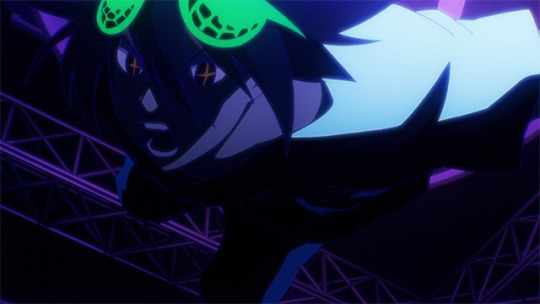
In The God of High School, the revelation that Jin practices “Renewal Taekwondo” serves as a shock to the cast, particularly the Judges and Park Mujin, as it reveals the fact that Jin’s grandfather, Jin Taejin, was not only still alive, but that he had passed on the incredibly powerful skills of Renewal Taekwondo to someone else. At this point in the anime, the reveal has played out far differently, although there’s no telling whether this might change as the anime progresses. We do know that Jin uses Renewal Taekwondo, but we don’t get the same backstory and discussion revolving around Jin’s grandfather, and the past regarding Taekwondo itself. In the WEBTOON series, Park Mujin reveals that “Renewal Taekwondo” was created by South Korean leaders following a defeat at the hands of North Korean “ITF” Taekwondo. And, suddenly, my childhood came back to me: I had learned “WT” Taekwondo, so what was “ITF?” Was it just something the web comic made up, like “Renewal Taekwondo?” As it turns out, this particular rabbit hole went a whole lot deeper, and weirder, than I ever imagined.
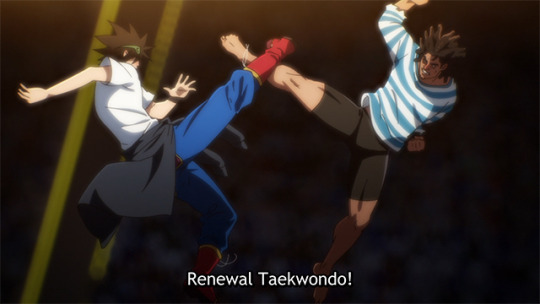
Perhaps the first, and most shocking, fact regarding Taekwondo is that it is less than 100 years old. Many historians agree there is some fluidity to a solid date, but as 4th Dan David Lo notes, Taekwondo likely began formally in 1955, when General Choi Hong-Hi named it after developing the first basic forms of the martial art. While many other popular martial arts, such as Karate, Tai Chi, or Kung-Fu often discuss their proud, long lineages, Taekwondo is often mistakenly assumed to be ancient; in fact, it is only perhaps somewhat related to Taekkyeon, which was nearly wiped out during Japanese occupation. After World War II, the Japanese occupation of Korea came to an end. During the occupation, Japan was particularly cruel to Koreans, suppressing their language, culture, and identity — extending this treatment to martial arts practitioners were forced to quit or go into hiding while Japanese Karate was taught instead. Taekwondo would come from the confluence of various martial arts, having more in common with Karate, mostly due to the violent banning of Korean culture.
Combining their knowledge with new techniques in Shotokan karate, Kung-Fu, and others, would begin to create schools, or “Kwans,” which would give rise to what we today recognize as Taekwondo. Scott Shaw, one of the eminent English authors and students of Taekwondo, explains the genealogy of the first 5, and subsequent 4, Kwans; these Kwans were fairly diverse, with nine divergent approaches and teachers developing their own takes on martial arts. In many cases, historians consider Song Moo Kwan the Kwan most responsible for eventual Taekwondo, with Byung Jik Ro called by some as the “father” of “modern” Taekwondo (more on that later) the original five Kwans — Song Moo Kwan, Chung Do Kwan, Moo Duk Kwan, Ji Do Kwan, and Chang Moo Kwan — were the birthplace of Taekwondo, but it would take another war, and social and cultural upheaval for Taekwondo to really emerge.
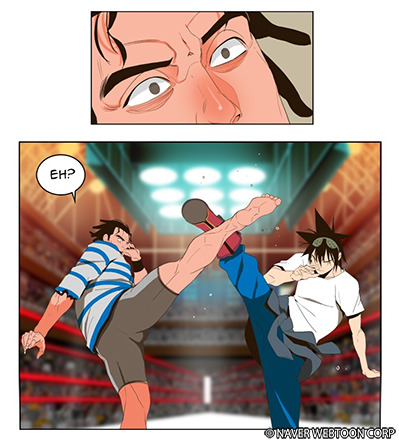
Song Moo Kwan and Chung Do Kwan were founded in 1944, with the other 5 founding Kwans appearing in the following 2 years. If we start Taekwondo’s timeline there, that means Taekwondo is only 76 years old (meaning there’s a good chance your grandparents might actually be older than Taekwondo!), but the “real” birth of Taekwondo would come a fair bit after these Kwans were founded. For that to happen, Korea would be forced into another protracted battle that would decide the course of its modern fate, and the dispersal of Taekwondo to the rest of the world: The Korean War.
Separating the country along the 38th parallel into what are today known as North Korea and South Korea, this civil war shaped Korea’s modern history in cataclysmic ways, separating family members, friends, and cultural identity. Like many aspects of Korean life, Taekwondo found itself straddling an uncomfortable and unclear line: The original Kwans were spread out across the Korean peninsula, with Song Moo Kwan being in what would now be North Korea. Following the Korean war, this would lead perhaps the most controversial figure in Taekwondo history to emerge: General Choi Hong Hi, the true “father” of Taekwondo.
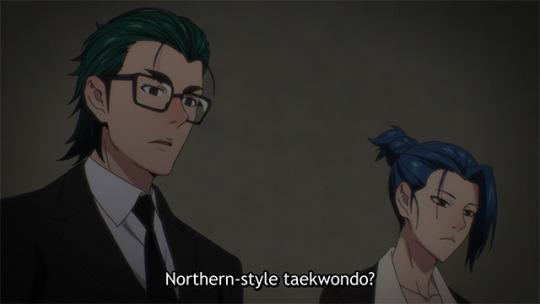
Alex Gillis' A Killing Art reveals the life, warts and all, of General Choi. Born in 1918 in Hwa Dae (located in now North Korea), General Choi Hong Hi was sent to Japan by his father to study, ending up in the tutelage of Han Il Dong, a master of Taekkyeon, one of Korea’s oldest martial arts. Forced into military service by the Japanese, Choi would eventually find himself continuing to serve in the Korean military following the end of World War II and Japanese occupation, earning the title of major general in 1954 (and thus earning him both his title and nickname, “The general”).
Choi’s mastery of Taekkyeon and Shotokan karate led him to develop what he titled “Taekwon-Do,” or “foot, fist, art.” Choi is, as far as historians can tell, the first person to use the word “Taekwondo,” and rightfully seems to deserve the title. The controversy, however, comes from the disagreements between Choi (who, some authors note, was somewhat disagreeable and even deceptive) and other Kwan leaders and Taekwondo practitioners. This would lead to the eventual creation, and split, of Taekwondo into ITF and WT schools, among many other offshoots.
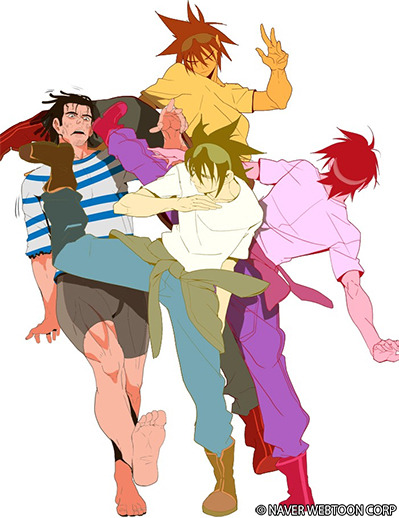
Whether Choi was or wasn’t a deceptive and deceitful person seems to be based on who you ask, and the most common perception of him was that he was complicated (as are we all). What authors and historians such as Lo, Gillis, Shaw, and others agree on is that without General Choi, there would be no Taekwondo, and the subsequent power struggle nearly destroyed, as Lo calls it, the “family” of Taekwondo. While it is perhaps more palatable to consider martial arts as monastic and scholarly, the reality is that they are practiced, created, and influenced by people, and Taekwondo’s somewhat ugly and public schism is a great reminder of this. Choi originally founded the ITF, or International Taekwon-Do Federation, in 1966; however, Choi’s attempts to control all aspects of Taekwon-Do, and the South Korean government’s insistence on “owning” Taekwondo, would create the split that saw Choi flee from Korea to Canada and South Korea creating the KTA (Korean Taekwondo Association), which would eventually give way to the World Taekwondo Federation (WTF, now known as WT), under the governing body of the Kukkiwon.
In the ITF version of this story, Choi simply decided to go “on tour” in 1959, before eventually creating the ITF in 1966. The WT version of the story is just as revisionist, claiming that Taekwondo has roots that supposedly go back 2000 years and that the WT was created in 1973 as the first governing body of Taekwondo. No mention of Choi or the ITF exists in the WT version of Taekwondo. Udo Moening, author of numerous papers about Taekwondo’s cultural and social significance, helps explain the disparity between these two stories by noting that Taekwondo is as much an object of political importance to the identity of Korea as it is a form of martial skill and discipline. Simply put, Moening argues, Taekwondo became a piece of the struggle for identity between South Korea and North Korea, and the eventual race to Olympic recognition would become a major victory in this battle for the WT and South Korea.
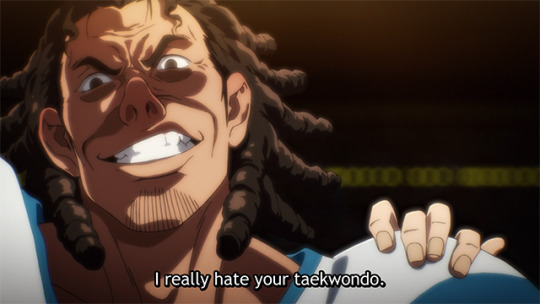
The schism in Taekwondo (or Taekwon-Do, in ITF’s usage) is perhaps even more interesting in the sense that one did not immediately replace the other; instead of the WT supplanting the ITF, the two schools of Taekwondo went about their own paths. Yet, Kukkiwon managed to obtain a significant victory over Choi and ITF Taekwondo: inclusion in the Olympics. In 1982, Kukkiwon was able to arrange a demonstration of Taekwondo for the IOC in 1988 and became an official event during the Asian Games in 1986. In 1994, Kukkiwon “won” the competition for Taekwondo legitimacy by being selected by the IOC as an official sport of the Olympics, joining Judo as the only other Asian martial art in the Olympic games, and debuting in the 2000 games in Australia.
Choi, however, had won in another way: his ITF Taekwondo spread across the world, and his somewhat ingenious method of sending Taekwondo “acolytes” to various places to form their own schools helped make Taekwondo popular and profitable. There are other forms of Taekwondo out there, including ATA (American Taekwondo Association), Jhoon Rhee Style, and the GTF (Global Taekwondo Federation), a split from ITF. Chuck Norris, during the height of his popularity in the '90s, even formed his own school that blended Tang Soo Do and Taekwondo called Chun Kuk Do!

While Choi was successful in spreading Taekwondo around the globe, and South Korea was able to claim “ownership” of the sport through political engineering and historical revision, Taekwondo in the United States would owe much of its growth and popularity to a different individual: Jhoon Rhee. Rhee, learning Taekwondo at the Chung Do Kwan in his childhood, came to America in the '60s to study engineering. Needing some extra money, Rhee began teaching Taekwondo, and through luck and hard work, launched the popularity of the martial art in the United States via television and Hollywood. Like all good and weird success stories, Rhee gained fame from his “viral” '70s commercial jingle, written by Nils Lofgren, guitarist for Bruce Springsteen’s E Street Band!
Rhee’s unconventional approach to success worked, taking his Taekwondo to both of America’s hearts: Hollywood and Washington DC. Rhee would go on to teach and demonstrate Taekwondo to various celebrities including Chuck Norris and Bruce Lee — even writing a book, Bruce Lee and I, in 2011. He also met with President Reagan and famously demonstrated Taekwondo to the United States Congress in 1965. There was even a sparring match between Republicans and Democrats!
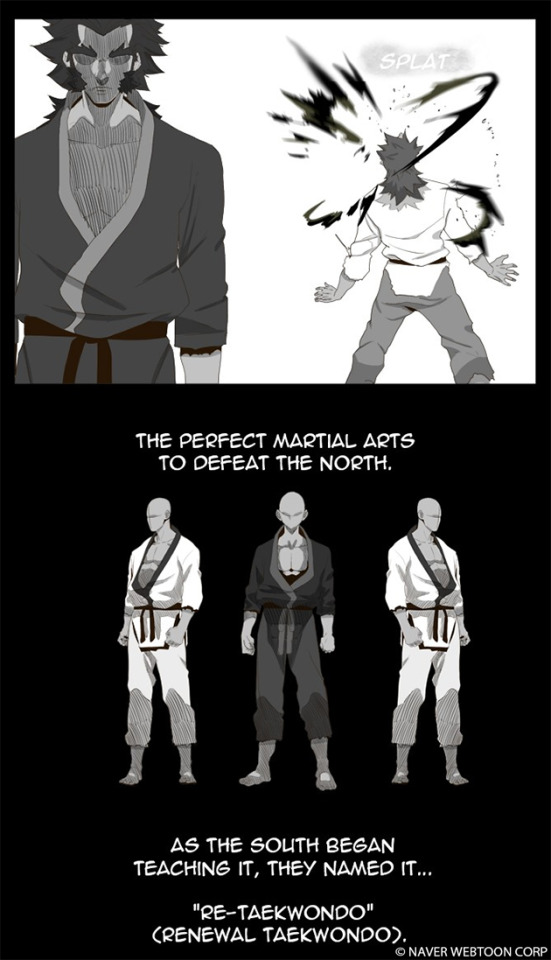
But what do all of these different types of Taekwondo actually mean? When I was practicing, did I learn “the wrong” type? Well, the answer is… no! The major difference in schools seems to come down to forms, ranks, and some other small administrative differences — such as who can spar, and why, or what types of focus there is in learning Taekwondo in general. Perhaps due to the odd nature of Taekwondo’s spread outside of Korea, the sport is also highly “commercial;” the ATA and Jhoon Rhee schools, for example, were founded on the idea of both teaching the sport and also establishing chain schools that would funnel profits back to the original founders, essentially creating a business instead of the somewhat monastic idea of a martial art like the Kung-Fu or Karate that appear in movies and media.
As noted by Doug Cook, the forms, of Poomsae, are constantly changing, due in part to the various types and hybrids of Taekwondo, but also due to the somewhat infant nature of the sport compared to other forms. It would be hard, as many authors point out, to find a “true” strain of Taekwondo these days. Instead, the various approaches, forms, and inherent teachings all help create different, unique ideas of the original created by Choi in the '50s — itself a hybrid of various types of martial arts.
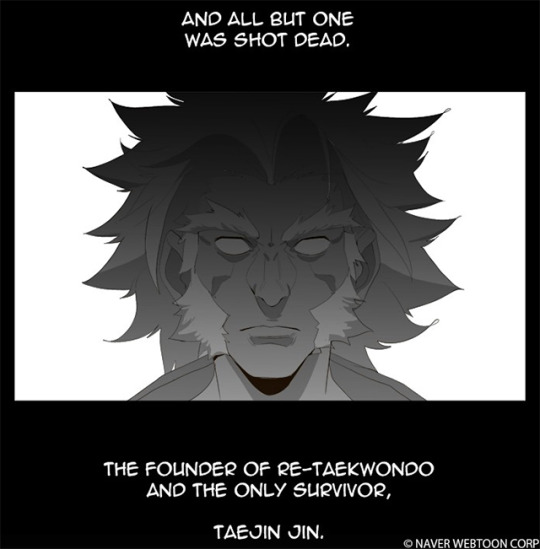
It's fairly common in martial arts stories to hear epic tales of the history and longevity of a martial art, but Taekwondo provides us with the unique and interesting experience of seeing that historical mythology evolve in real time. From the controversial Choi to the roots of the Korean search for identity following Japanese occupation and later civil war, Taekwondo serves as a mirror for Korea’s own evolution. While Taekwondo may not be an “ancient” form of martial arts, it is a uniquely Korean one, and one that has a complex history and personality, and thanks to The God of High School, I found myself falling into the rabbit hole of its story. “Reclamation” Taekwondo may not actually exist, but in many ways, Taekwondo was a form of reclamation for Korea: an attempt to create something new and unique in the face of years of brutal occupational rule and civil strife.
Did you know about the history of Taekwondo? What's your favorite style to practice? Let us know, and while you're at it, tell us your current fave WEBTOON series in the comments!
➡️ Watch The God of High School today! ⬅️

Nicole is a frequent wordsmith for Crunchyroll. Known for punching dudes in Yakuza games on her Twitch channel while professing her love for Majima. She also has a blog, Figuratively Speaking. Follow her on Twitter: @ellyberries. Here's that serotonin you ordered.
Do you love writing? Do you love anime? If you have an idea for a features story, pitch it to Crunchyroll Features!
3 notes
·
View notes
Text
CanvasWatches: Carole & Tuesday
A charming SciFi anime focusing more on the cast’s day-to-day lives than some major sociopolitical conflict that requires laser gun diplomacy? Set on a Terraformed Mars with brick and mortar solarpunk aesthetic? I can get into that.
The fact that Carole & Tuesday is a science fiction story came as a surprise, as most of the buzz and promotion that crossed my social feeds focused on the street performance aspects. Then, surprise! Tabletop fast food ordering and pizzerias that grow their tomatoes in house![1] Which is the sort of speculative fiction I’m enjoying nowadays: normal life with the fantastic acting as seasoning to spice up the world around them.
I’ve never paid special attention to music. I listen to music obviously, but rarely in any sort of analytical capacity. It’s pretty sounds that help fill in the background while I write, or to convey emotion in a musical, or to mark the start and end of a show I’m watching. I’ve never sought out music to listen to when looking for entertainment, it’s always a byproduct of whatever media I’m engaged with at the moment. Heck, these days, when I’m too lazy to set my car radio up to play a podcast, I just drive in silence.[2]
I sometimes feel I’m missing something by not engaging with the art form in a more conscious manner, and I only recently became aware that albums are a carefully curated thing instead of a collection of the performer’s most recent songs, so… yeah. Kind of a cultural blindspot.[3]
This tangent doesn’t even end with a neat little note of how Carole & Tuesday had inspired me to consume music in a more deliberate and contemplative manner. The soundtrack includes plenty of insert songs I happily threw on my background noise playlists,[4] and what few albums I seek out are video game and anime soundtracks.[5]
Carole & Tuesday was chiefly directed by Shinichiro Watanabe, who’s name was made with the Jazzy Space Epic Cowboy Bebop and Hip-Hop Samurai Series Samurai Champloo. It was probably inevitable he would produce an anime where music took front stage instead of informing tone.
Carole & Tuesday takes inspiration from Pop, but is unafraid to feature and mix other genres, such as Opera and Rap.[6] What’s really exciting is the decision to have the insert songs performed in English.
Historically, when diegetic music is present in anime, the song is performed in Japanese, and most dubs make the smart decision to leave the japanese audio and subtitle them. I may prefer dubs for my various reasons, but I wouldn’t dare ask for the policy on subbed music to change. Carole & Tuesday took an international view to its production, and thus used the most widely spoken language when no one (reasonable) would begrudge the use of Japanese performers.
Netflix picked up the show as part of their continued haphazard attempts to seize the genre with an attitude out of the early 2000s, and the company tapped to record the English dub did an admirable job matching voice performances believably similar to the singing voices.
Which may be the first time that speaking actors were hired to fit the singers.
The story takes place on Mars in the future year of… 50 years after humanity started migrating to Mars. I cannot find a year cited, which is the smart and wise choice and I am super annoyed I’m not going to be able to make jokes about the production's attempts and failure to predict the future.
50 years after starting to migrate over to the red planet, humanity has terraformed large swathes of Mars into a Solarpunk paradise. Earth is apparently not in a great state as refugees are desperately making their way to the planet, but Earth remains offscreen for the entire run. Fortunately no one has any giant robots,[7] so the two planets aren’t at war. While Mars has been made hospitable enough, the atmosphere does occasionally mess with the genetics of residents.
That’s just background details, however. The story is really about the titular duo. Tuesday is introduced fleeing the mansion of her politician mother, hopping onto a cattle train like Kiki, and riding off to Alba City with only a quitar and robotic luggage to keep her company, where she stumbles upon Refugee Orphan Carole busking with a keyboard. The two have a jam session and decide to become a musical act.
Meanwhile, famed child star Angela Carpenter[8] is setting to transition from a modeling career to an exciting career singing. Her mother pulls strings and utilizes her connections to team up with Tao, a genius of Artificial Intelligence Design who is willing to use his technology to provide Angela with computer generated music and lyrics.
Thus we have the start of a sci-fi John Henry Tale where the battle is not hammer and steel but instruments and voice.
I say ‘the start’ because while the two teams utilize different methods to produce their music, their methods are never weighed against one another. In fact, there’s barely a one-sided rivalry, as Angela is jealous of the titular duo’s ability to enjoy their career, and our two heroes take only a polite, professional view of Angela’s rising career.
Carole and Tuesday are both weighed down by a common problem with anime protagonists: they’re just nice. There’s a certain fear when writing protagonists, especially females, of accidentally making them off-putting that the writers overcorrect and don’t let the hero make mistakes or have much personality, to the point that Carole and Tuesday have very little agency.
Instead, it’s Gus, the ex-rock star manager the duo acquire, that does the leg work and takes risks while Carole and Tuesday just sing nice songs then sit back while the plotlines orbiting their rise to success are resolved by the men.
The show also can’t choose a lane, playing with several story threads that could carry full 24-episode stories by themselves, but instead are dealt with as lightly as possible.
We start with the story of a run-away from decadence and a refugee bringing their world views together, but that instead goes into a tournament arc disguised as a talent contest, then the drama of navigating the music industry, before ending with the presidential run of Tuesday’s mother causing public unrest. Carole and Tuesday don’t make a meaningful choice that affects any of these stories.
Meanwhile, Angela gets a story of asserting her identity while already in public view, facing dangers both external and internal on her journey.
Surprisingly, this is the first show in a while that I didn't resent for transitioning out of the episodic, playing with the premise portion. While Carole and Tuesday were attempting to get their big break, bopping around misadventures trying to get contacts, gigs, and filming a music video, Angela looms in her plotline, building up to the inevitable rivalry.
Angela is introduced just before her mother, Dahlia, starts reworking Angela's career from modeling to singing, hiring Tao, renowned AI designer, as Angela's producer. Angela experiences mild paranoia from Tao's standoffish nature, machinery, and making a holographic simulation of Angela. So Angela had a more consistent narrative during the first arc.
Introductions out of the way, it's time for everyone's favorite trope: the tournament arc! In the form of ‘Space!'s got Talent’ Generic Brand Named into Mar's Brightest. The main duo meets their rival, backstage drama ensues, some very good music is performed, and things are set up to technically give both Carole and Tuesday as well as Angela a win at the end.
With publicity achieved, Gus starts getting to work preparing the girls' debut album and booking appearances, as well as meeting other artists and (briefly) Carole’s father. We learn about Gus’s past client, Flora, who dropped Gus as soon as she found success, then found herself without a support base and spiraled into depression and addiction. Carole and Tuesday remain upbeat and optimistic.
Meanwhile, Angela starts getting harassed by a stalker and feeling helpless and poorly supported by those around her. Tao takes point on stopping the stalker when the police fail, ultimately taking him down before the stalker could pull a Mark David Chapman.
The story bleeds into the final act, as the presidential campaign of Valerie Simmons, Tuesday’s mother, moves forward in prominence. The AI algorithm Valerie is utilizing suggests she take an anti-immigration stance, which the woman follows in an attempt to further her career. Musicians are getting harassed by law enforcement, Tuesday’s brother Spencer is becoming uneasy with being an accessory to the campaign, and starts meeting with a reporter with information that Valerie’s campaign manager orchestrated a terrorist attack to villainize immigrants. Spencer and the reporter argue over how many chances to give Valerie, and agree on Spencer taking the evidence to Valerie, and if she doesn’t back down, then they’ll leak the scandal. Valerie, seeing the crimes committed for her benefit, gracefully renounces her candidacy. It’s very heart warming.
Carole and Tuesday write a protest song, and gather friends to sing it. This protest song has no observable impact.
Meanwhile, Angela learns she’s adopted, and her mother suffers a heart-attack shortly before Angela is set to win a Martian Grammy, and Angela spirals into depression and prescription drug abuse, to the point of collapsing at the end of her Grammy performance, being rushed to the hospital and missing her mother’s passing and funeral. Angela is adrift. She has no family, no support, and is just lonely.
Tao, who was working to sabotage Valerie’s campaign and burning as many bridges as possible after being targeted for refusing to assist the campaign, appears in Angela’s hospital room to drop a bomb: both he and Angela are designer babies, and though Tao must go into hiding now, he does intend to look out for his little sister.
Angela joins the performance of Carole and Tuesday’s protest song.
If it’s not already clear, I feel the story of Carole and Tuesday themselves was pretty lacking.
So, how would I rework this? Step one: we’re either cutting Carole and Tuesday, or combining them into a single character and making Angela the second. With the second option, Angela can maintain her backstory, but take Carole’s introduction of fleeing her family mansion and attempting to strike out on her own, meeting up with Carole and forming an act. To maintain the final arc, Carole would need to be reworked into the abandoned daughter of Tuesday’s late father, making her the half sister of Spencer and something to be hidden by Valerie Simmons’ campaign.
We then intermingle the two plotlines: Gus maintains his managerial position, and eventually convinces Angela to use her connections and mother to get her career jumpstarted, Ms. Carpenter still brings in Tao to write music, and now we can lean more into the AI-written music versus human compositions subplot as well as creative differences, which can lead to an arc where Angela and Carolday split to attempt solo careers, each taking a different manager.[9] Dahlia still has her issues and passes away, Angela her depressive spiral, but now Gus gets pathos by being there to help his client out of self-destruction, and the final number can also be a reconciliation of the main musical duo. The song can even be a combination of AI and human composition.
Carolday, meanwhile, discovers her relation to the anti-immigrant candidate and has to decide if she wants to finally have a family with Valerie and Spencer or stand up for her beliefs and assist a politician in bringing the campaign down. The resolution of the political plot can remain a happy compromise, but Carolday gets a slightly more active role in it.
The animation and world-building is great, and Angela’s arc is very strong. But the writing was too afraid to let either Carole or Tuesday dip into unlikeability that they become props to their own storyline, which is made further unfortunate as their supporting cast that do make decisions are mostly men.
The series is also riddled with a lot of good starts. Many short vignettes or minor details that could be made into full animes by themselves. Show more of Carole and Tuesday’s attempts to break into the music industry while also trying to pay bills and put food on their table. An expansion on the other competitors at Mars Brightest.[10] Heck, expand the roster of the competition and dig more into backstage drama. Carole’s father, who was sent to prison and found his wife dead and daughter sent to another planet upon his release, could carry a story of his own on his back! Valerie’s presidential run and the plight of Earth immigrants given more attention. Heck, even the story of how Earth, the origins of the human species, fell into being a third-world planet people are desperate to leave.
I’d even watch a series about the solarpunk pizzeria that grows their own tomatoes.
The music is really good, however, featuring many artists and styles, and those by our main duo wouldn’t sound out of place on a car radio or licensed on a primetime television show.
It’s a good show, but not an eternal classic. Maybe a second choice for someone digging deeper into anime. However, if its placement on Netflix means it’s someone’s introduction to Anime, that wouldn’t be terrible. Give it a watch if you want something to wind down for bed, or want inspiration for your own speculative fiction.
Kataal kataal.
-
[1] Solarpunk’s neat.
[2] Mostly because I lost all my preset stations last time I took my car in for fixing, and I don't actually know any to punch in. Also, I use youtube for music when writing.
[3] Also means I’m wholly unprepared to find music when I finally get a podcast project off the ground.
[4] The soundtrack is very present on Spotify, which is nice.
[5] I am finding myself increasingly intrigued by vinyl records, however. Probably a bit extravagant, and difficult considering my narrow interests.
[6] Presumably to annoy fans of both.
[7] Bam! Gundam reference! Anyone have Bingo yet?
[8] Though I could swear they never use her last name on screen.
[9] I’d find it amusing if Angela takes Gus and Carolday teams up with Dahlia, but the rest of my outline works better if Angela remains with Dahlia.
[10] Though this one’s not a major loss. Typical tournament arc stuff.
3 notes
·
View notes
Text
Mahusetan Institute of Anime and Manga advises against watching Netflix release of Neon Genesis Evangelion
Lazia, 2 July 2019
Anyone with any interest in anime has probably at least heard of the Neon Genesis Evangelion, the popular anime series which has recently been licenced for an international release by the streaming service Netflix. Evangelion debuted in Japan in 1995 and has since earned a reputation as a unique, psychologically complex, difficult piece of art. The franchise is also a cult classic – equivalent in acclaim, auteurship, and cultural footprint to America’s Twin Peaks or 2001: A Space Odyssey.
Netflix’s highly anticipated rerelease of Neon Genesis Evangelion was supposed to be a triumph for the company and for the anime fandom – but the show’s streaming debut has already been met with fierce backlash from a significant subset of its vocal fans, taking issue with Netflix’s new English translation, which replaced the one that first came to the United States more than 15 years ago, as well as the omission of the series’ iconic ending theme song, a version of “Fly Me to the Moon.”
Evangelion has been one of the most popular anime series ever created since its very start. Series creator and director Hideaki Anno conceived of the show as a rather postmodern mecha series. The protagonist Shinji Ikari fights monsters in what is more or less a giant robot, though it looks ominously humanoid, and is tasked with saving humanity at the young age of 14, only to learn that saving humanity takes a massive toll on his mental health. Along the way, Evangelion stages epic, city-demolishing fight sequences and manages to make a nuanced argument for the human condition.
The show opens as an action series centred on several characters in the near future fighting the so-called “Angels,” incredibly destructive beings that demolish buildings and seemingly want to wipe out humanity. By the final two episodes, however, its plot has taken a backseat to simplified animation and a patchwork of voice-over–driven psychoanalysis of its main characters. When the final two episodes aired, its director infamously got death threats because viewers were so put off by the shift.
On the whole, the franchise can be grim – and it doesn’t always make perfect logical sense – but it’s also fascinating television and filmmaking.
For the better part of the last decade, Neon Genesis Evangelion had previously been out of print after its English-language licensee, ADV Films, went out of business in the late 2000s. The only way you could watch it for years was through potentially illegal pirating methods or buying after-market or bootleg DVDs.
Thus, the show was locked in a strange state of rights limbo over the years, with rampant speculation as to how much it might cost a Blu-ray distributor or a streaming service like Netflix to licence the whole series. In the end, Netflix did pick up global streaming rights to both the TV series and the movies in a deal that likely cost north of $3 million, by conservative estimates.
When the series hit Netflix, fans raised questions over changes that Netflix made to the show’s translation into English for both its audio and subtitle tracks. The dub that appears on Netflix’s release is not the same English ADV dub released in the early 2000s, nor are the English subtitles the same. Instead, what appears on Netflix are new translations of both.
The translation issues fans have noticed are numerous and on the whole aim toward a more literal translation, often at the expense of Evangelion’s themes and subtext. One particular scene that became a target of backlash originally featured an emotional exchange between the protagonist Shinji and the male character Kaworu Nagisa with heavy homoerotic subtext. In the original English dub, Kaworu tells Shinji “I love you,” whereas in the Netflix dub, it seems to have been reframed as a less overtly romantic kind of friendship – to the extent that in some scenes, the word “love” has been replaced with more euphemistic words, with Kaworu telling Shinji “I like you” in Netflix’s new translation.
The moment serves a powerful narrative and thematic purpose, given that it comes at a moment in the plot where Shinji feels he is utterly unworthy of love. The concepts of loving and liking are defined differently in Japanese from how they’re defined in English, so while “like” may be a more literal or true-to-source interpretation, the change has been criticised for turning a homosexual relationship into a non-sexual relationship.
That isn’t the only place where Netflix’s translation’s dialogue has been criticised for feeling unnecessarily stilted by comparison. Whether it’s Misato casually describing herself as an “international civil servant” in the new dub versus a “government official” in the first one – or the way the new dub refers to the individual pilots as the “first children” or “second children” as opposed to the “first child” or “second child” – or the fact that the new dub’s pronunciation of secret government agency Nerv being inconsistent throughout – it has been met by intense criticism by fans.
The new dub also recast the voice actors for the show, to the dismay of the cast behind the original English dub. The rumors were later confirmed as Casey Mongillo, Ryan Bartley, Stephanie McKeon, and Carrie Keranen were cast in the roles of Shinji Ikari, Rei Ayanami, and Asuka Langley Soryu, and Misato Katsuragi, respectively – replacing original English cast members Spike Spencer, Winn-Lee, Tiffany Grant, and Allison Keith.
To the dismay of those who love ending credits, Netflix’s release also omitted Evangelion’s iconic, karaoke-style renditions of Bart Howard’s “Fly Me to the Moon” from its American release. The song was primarily performed by Claire Littley and Megumi Hayashibara in the original release, along with variations and alternate versions appearing on each episode, for a total of 31 versions of the song. It has been replaced with a piano track from Evangelion’s soundtrack.
The Mahusetan Institute of Anime and Manga has advised its members against watching Netflix’s release of Neon Genesis Evangelion in response to these changing, stating that it believes the Netflix release to be inferior to other, potentially illegal, methods of watching Neon Genesis Evangelion. It has also recommended the usage of browser plugins recreating a version of Evangelion similar to the original release.
2 notes
·
View notes
Text
Meet the 2019 Roots Cohort
In search of their ancestral villages, 11 people of the Chinese diaspora hailing from the Bay Area and Boston will soon travel to the Pearl River Delta in Guangdong 廣東省, China. We will visit 5 different areas, including Kaiping 開平, Taishan 台山, Xinhui 新會, and Guangzhou 廣州.
Sarah Tan
譚美婷
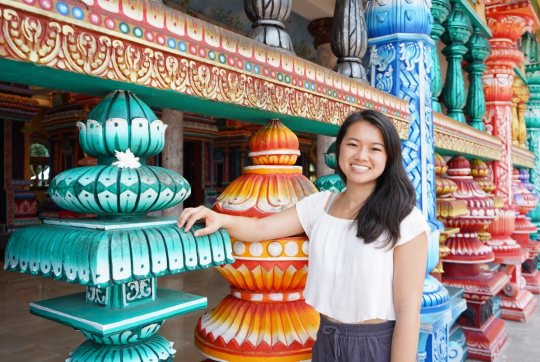
Village
My mother’s and maternal grandparents’ village. 永安村 (Yong’an Village) in 台山 (Taishan)
What do you do for fun?
I enjoy strength training at the gym, hanging out with friends and family, attending music concerts, watching basketball, and learning more about photography.
How did you hear about Roots?
My sister had a handful of co-workers who participated in Roots Plus (2018). They wrote a blog post for work and my sister shared it with me. I also recently found out that my favorite professor at UCLA was a rooter!
What are you looking to accomplish?
Growing up, my mother told me many stories about her humble beginnings and what it was like to grow up in a village. I look forward to living and experiencing the community and environment my mother and maternal grandparents came from before immigrating to the United States.
What are your expectations?
I do not have any expectations going in. I just know it will be a trip of a lifetime and this experience will help me reflect on who I am today
Choose a food that describes you?
BURRITOS! Yummm!
Alexander Kwok
郭智光
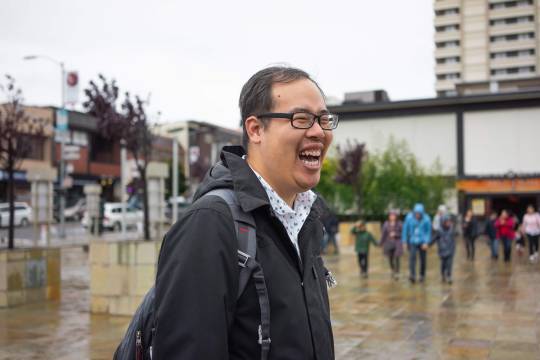
Village
I would like to visit my paternal grandfather's village 隔塘村 (gaak tong cyun) in Zengcheng 增城. I decided to save my paternal grandmother's village 南朗鄉 in Shunde 顺德 for another time, as I have a lot more resources on my paternal grandfather's side than I do for my paternal grandmother.
What do you do for fun?
I like to read, play video games, blog, listen to music and podcasts, bake; go camping, hiking, kayaking; try new foods and explore new places!
How did you hear about Roots?
I've been doing research on my paternal grandfather's side of the family for 5 years now but hit a wall when I tried looking for our home village. As a lot of the resources seemed to focus on the Sze-yap area of 廣東 Province, I wasn't able to do much more and stopped trying to find it.
One day, I was looking for more resources and came across an old website under the Chinese Culture Center, which redirected me to the Him Mark Lai Digital Archive. After some exploring, I found the database of villages in 廣東 with associated surnames, but none of them included my home village.
I thought I had hit yet another brick wall - until I started googling one of the headers in the Digital Archive, "The Roots Program". I quickly found references to the program and old exhibits on a few websites but thought they might have stopped the program because I didn’t see anything recent. Imagine my surprise when I found the Friends of Roots site & the Tumblr blog…!
What are you looking to accomplish?
Growing up my paternal grandparents spoke mostly Cantonese, so I never got to ask them questions about their childhood, how they met, or what it was like to raise a family in Hong Kong, let alone about my ancestors or our home villages. I’m hoping to regain some of these stories from our family through visiting relatives in Hong Kong, where my grandfather’s and father’s generation grew up and paying my respects at family graves across Hong Kong.
Through visiting my paternal great-grandfather’s home village in China, I also hope to regain a sense of identity that our family has since lost. Even though my paternal great-grandparents left the home village to go to Hong Kong in the late 1930’s, my great-grandfather had to leave the family at the start of the war, because the family was afraid something would happen to him in a city under Japanese occupation. Our family never heard from him again, and it was presumed that he had passed away back in the home village. Though my grandfather has been back to the village in the late 2000’s, he didn’t talk much about his trip with the rest of our family, and we don’t have any records where the village may have been.
So, in visiting my home village and reconnecting with whatever family is left there, I hope to learn more about my great-grandfather and grandfather’s generation, as well as reconnect with family still there. I also hope to get a sense of what growing up in the village might have been like for my great-grandfather, what he liked to do, what the village looks like, etc.
What are your expectations?
I don’t have many expectations other than going back, reconnecting with family there, and seeing what the village looks like. My great-grandfather returned to the village in the early 1940s, so I would like to visit his grave if I can. I’ve heard that when my grandfather went back to the village, he rebuilt his father’s tomb at the time.
But I can’t wait to taste all the delicious food in Hong Kong & Guangdong, learn more about overseas Chinese - including those who migrated to Southeast Asia, hopefully, and get a sense for what Southern China is like.
Choose a food that describes you?
Jakarta-style bakmie - It's something that I grew up eating as a part of birthday celebrations, represents both the Chinese & Tionghoa (Chinese Indonesian) sides of my family, & reflects on a range of experiences that I share with others being a part of multiple cultures.
Rachael Tang
鄧安琪
Kathleen Wong
黄玉明
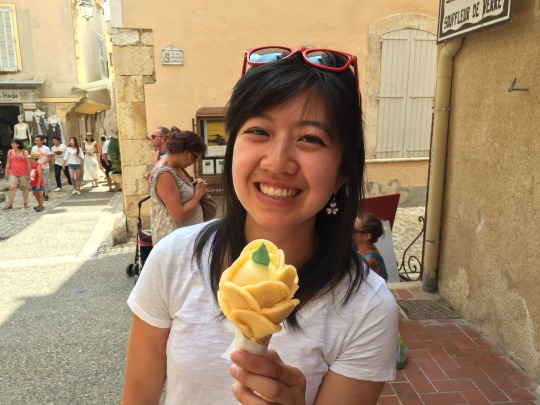
Village
Kaiping, Guangdong Province, China. 開平中股鄉赤坎屋上樓村.
What do you do for fun?
Rock climbing, running, cooking, and adventuring!
How did you hear about Roots?
I heard about Roots through co-founder Al Cheng. My boyfriend introduced me to him as we were having a delicious bun bo hue lunch. At the end of the lunch, Al remarked that I probably have roots in Guangzhou. We connected on Facebook and I saw his program posts. I was intrigued, applied, and the rest is history!
What are you looking to accomplish?
After an intimidating visit to Hong Kong in 2011, where I could not demonstrate enough language skills to get around, a visit to China seemed so intimidating. This will be my first trip to the mainland so I’m hoping to get a better understanding of Chinese culture and connect it with my upbringing.
What are your expectations?
Good food, good company, and hopefully not too many mosquitos!
Choose a food that describes you?
Ice Cream :) Sweet and refreshing!
Jenny Lau
劉健儀
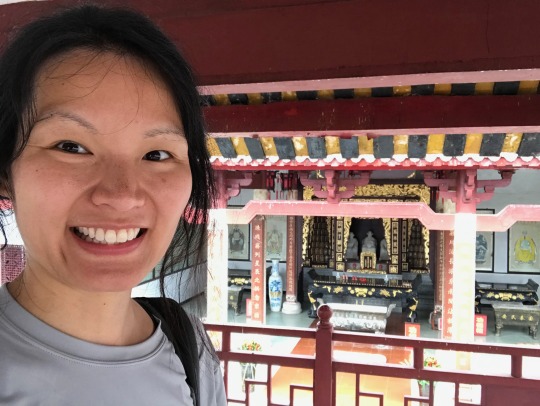
Village
漢塘村 in 台山市省冲蔞镇達材鄉. The village is where my parents were born and raised and also where my paternal grandfather was born and where my maternal grandfather grew up starting around five years old.
What do you do for fun?
I enjoy hanging out with my friends, eating good food, being in nature, exercising, watching movies, sharing stories, being present.
How did you hear about Roots?
I visited the Roots website after seeing a facebook post linking to it from a friend.
What are you looking to accomplish?
I am looking to better understand my parents by visiting the village where they were born and grew up and to imagine what life must have been like for them. I also want to talk to people who might remember my grandparents and have information about them.
What are your expectations?
I would like to connect with my fellow Rooters, hear their stories and why they wanted to do Roots, visit my village with my brother, who is also a Rooter this year, and to see the village that he chose. I would like to learn more about Chinese history, especially when my parents and grandparents were living in China and to contextualize family events within broader Chinese history.
Choose a food that describes you
Some of my staple foods: white rice with laap cheng and chau baak toi thlem (Chinese sausage with stir-fry baby bok choy) and unsweetened Hong Kong (HK) style milk tea. The rice dish appears simple but is very hearty like me, with the right mix of meat/veggies, sweet/savory. At the same time, I am unique in my bold and deep expressions, similar to HK milk tea, which is a unique spin to a classic tea with milk concept but it's particularly bold in flavor because it's double- or multi-brewed and it's full of depth from evaporated/condensed milk.
Michael Tom
譚振豪
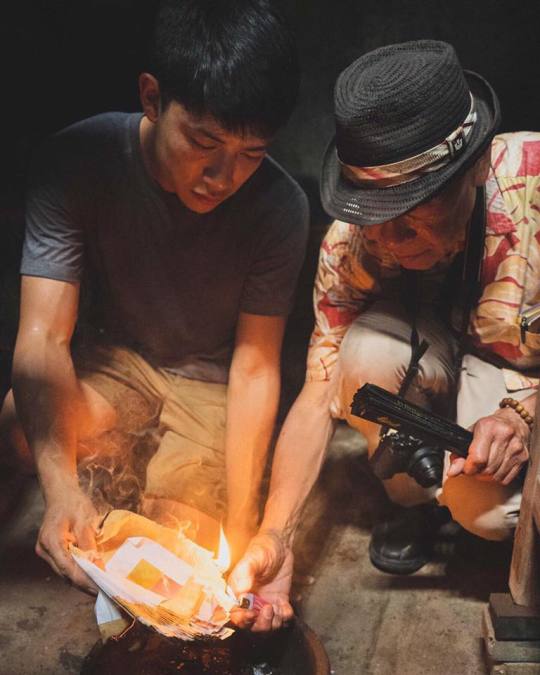
Village: 台山水步毛坪村 (Taishan Shuibu Maoping Village)
What do you do for fun? I like to do indoor bouldering, taking photos, and hanging out with people
How did you hear about Roots?
My cousin, Scott Leung, and my aunt and uncle, Ray and Karen Leung, all went on Roots and recommended that I check it out
What are you looking to accomplish?
I just wanted to see where my grandfather grew up and where my greatgrandfather and greatgrandmother lived
What are your expectations?
I didn't have any expectations because my family hasn't had any communication with the village since for the past 40 years. I went in with an open mind, ready to accept every new experience
.Choose a food that describes you?
Kettle Corn. Savory is serious. Sweet is fun. I'd like to think I'm both, but also 90% hot air.
Angela Yip
叶嘉宝

Village
Wong Cyun in Toisan - 台山 三合 潢村 河清里. This is my paternal great grandfather's village
What do you do for fun?
Eat! There's so much amazing food in the Bay Area. I also love keeping up with my bullet journal, going on hikes, and reading fiction. I've really been enjoying reading books by Asian American female authors lately. Some recent favorites are Chemistry by Weike Wang, Everything I Never Told You by Celeste Ng, and A Place for Us by Fatima Fahreen Mirza.
How did you hear about Roots?
I heard about Roots from my mom's cousin's wife Liana Koehler, Roots alum and Roots lecturer. It came up in conversation at dinner after my grandpa's funeral. She said I had to do Roots, and I was immediately sold. Roots came at the perfect time.
What are you looking to accomplish?
I am hoping to learn more about a side of my family that I don't know much about--my paternal grandma's side. I grew up extremely close to my grandma, and I want to be able to show her pictures of her father's village because she was never able to visit. I also just want to learn more about Toisan, even basic information like what people eat and grow and what they do for fun. Both sides of my family are from Toisan, so it has shaped my family and my experience of being Chinese in the US in huge ways, but I know very little about the region.
What are your expectations?
I hope to find the right village! Other than that, I am trying to approach my rooting with little expectation and to stay open to whatever might happen. I expect it to be an emotional experience for me for sure.
Choose a food that describes you?
Fried rice from Fung Wah on Mission Street in Daly City
Jeffrey Lau
劉健仁
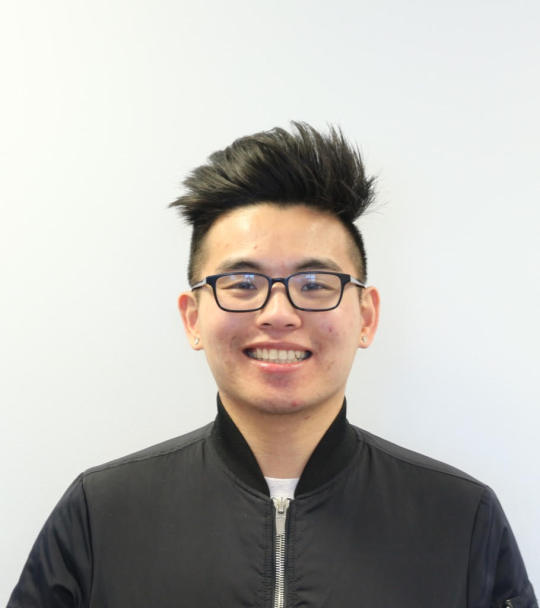
Village: I'm visiting my paternal grandma's village of 衝洋向南村
What do you do for fun? I hang with people that are easier for me to hang with for fun.
How did you hear about Roots? I learned about Roots two years ago from a friend's Facebook feed! I marinated on the idea of applying until I actually did.
What are you looking to accomplish? I’m looking to reflect on my relationships with family members who’ve had the most direct impact on my life—like the one with my paternal grandma, who raised me. I want this trip, in the long run, support my process of grounding more of my life in my Chinatown organizing work.
What are your expectations? My expectations are simply to get a feel and look of where my grandma grew up. She don't tell me much herself, so I’m gonna discover more about her myself.
Choose a food that describes you? I'm gonna say fries. Fries done well are golden and crispy, but get kinda whack over time as they get soggier. I usually start strong in many things but my energy dips over time and some times I'm kinda whack towards the end, haha...
Hannah Yee
余壽玉
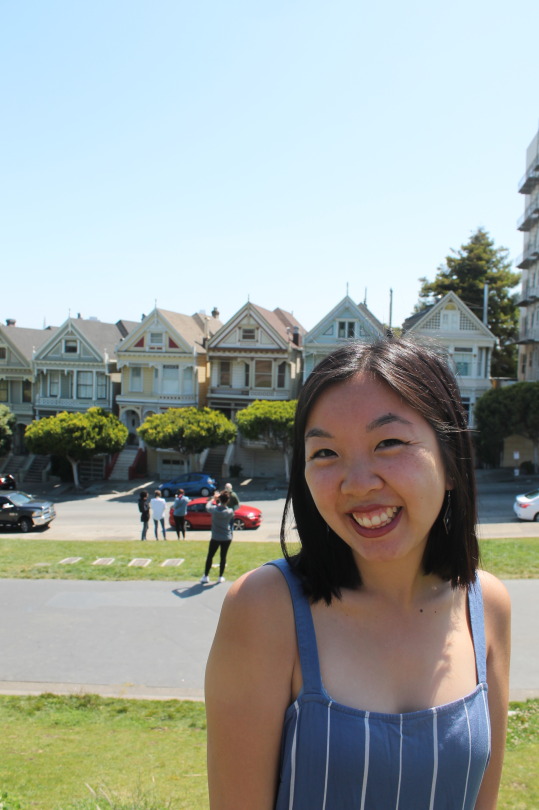
Village - Dick Hoi, Toisan
Fun - I dance, garden, bake, and love being in the outdoors
Hear about Roots - Through my sister who found out through social media haha
Accomplish - (?) in life? in roots? - For Roots I wanted to accomplish finding my village, seeing the school I have heard so much about, and finding a base of friends who want to explore their Chinese American identities together and eat good food together. Expectations - I didn't know what to expect from this program. I expected it would be exciting, rigorous, tiring, and fun. I also expected it to be like solving a mystery/Clue/puzzle
Food - Dung/Jung - Have to open up the leaves to enjoy the inside! Filled with surprises like peanuts, lup cheong, egg, etc. Warm, comfort food that is a classic! Picture - I'll send you one once I get home!
Fiona Wong
黃寶賢
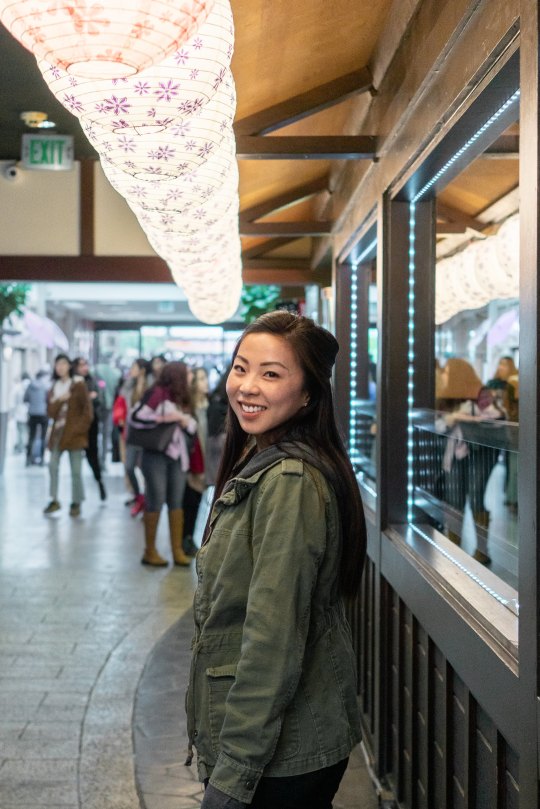
1. Village
中國廣東省台山市白沙鎮潮境众亨鄉潮興里
Bak Sa, Toishan
2. What do you do for fun?
I enjoy exploring new places, trying new things, and checking things off my to-do/travel bucket list during my free time. I love spending quality time with friends and family while having delicious food. As long as it is a day with blue skies, I do not mind what I'm doing as long as I'm outside!
3. How did you hear about roots?
I heard about roots through a friend who went on this program and shared her experience through social media.
4. What are you looking to accomplish?
I am looking to dive deeper into the history of China and Chinese immigration to the states with emphasis on Cantonese and Toishanese context. I am excited about the opportunity to visit other villages in the Pearl Delta River Region and to return to my ancestral village.
5. What are you expectations?
I did not have much expectations going in other than hoping that our cohort will support one another wholeheartedly.
6. Choose a food that describes you
Some type of dish that has onions because I have a lot of layers.
Nicole Wong
王雅斯

Village
I'm visiting my paternal great grandfather's village: 江門市蓬江區荷塘镇三丫沙滘村.
What do you do for fun?
I love to cook food and sing with friends, join the occasional pick-up soccer game, try different dance classes, read, and get outside.
How did you hear about Roots?
I first learned about Roots from my mom, but it wasn't until I heard Steve Owyang speak about the program at a CAA anniversary dinner that I seriously considered applying.
What are you looking to accomplish?
To learn more about my family's history so I can understand myself better and connect more deeply with my Chinese heritage.
What are your expectations?
To meet my Xinhui relatives and see the village, old house, house, and gravesite of my ancestors.
Choose a food that describes you?
Peanut butter (because I love it and chew on ideas/questions for a while
1 note
·
View note
Text
BLOG #1: This is what makes me, me.

I’m just like you. For the most part my life is totally normal.
(If you know where that’s from I love you.)
But that’s a damn lie my life kind of reads off kind of like a film or book character’s backstory because well you’ll see how crazy it gets.
I was born in 2000 to a biracial couple in Colorado who then made their way to California where our family grew. My sister was born in 2001 (now 17), a brother in 2003 (now 15), another brother in 2005 (now 13) and another sister in 2006 (now 12). Sometime around 2007 it was clear my dad had lost his damn mind from drug and drinking. He became verbally and physically abusive towards my mom and mainly verbally abusive towards me. I was 7 I was essentially raising my siblings since my paternal grandmother was too old and sick to properly raise us.
One day when I was around 8 or 9 my dad was chasing my mom through the neighborhood, when he was arrested at the same time a white van pulled up. Nope not a kidnapper, much worse in my child mind, it was Child Protection Services. And that is the day my 4 siblings and I ended up in foster care. Moving houses every few weeks and weekly visits with mom while visits with dad didn't exists. My maternal grandparents take us in and raise us to be white. I don't think it was intentional but everything they did seemed to erase out blackness and replace it with what they found acceptable. What made me noticeably black, was my hair and in months it had been fried off from heat damage and perms. Soon the case comes to an end and my mom gets full custody. My dad is sentenced to somewhere around 6 or 7 years behind bars. My mom barely got us back when she gave birth to my half brother in 2010 (now 8).
From 7th to 9th grade I isolated myself from the world and wrote. In those 3 years I had filled 23 composition notebooks. Writing was what kept me alive, I wrote everything from poems and songs to short stories and full blown novels. Then sophomore year hit and writing didn’t help me anymore. I had become “(my first name), the lesbian one”. Which had me mad because I wasn’t even lesbian, I was pansexual and nonbinary but I wasn’t out yet so I ignored the comments. I needed something new to focus on so I jumped into everything. I was into anime and manga, I joined a Kpop dance group without knowing what Kpop really was. I joined the class of 2018 club on campus and became the artist, then I got into film and fell in love with writing and directing films.


(Both of these photos were taken in Kyoto during our last week in Japan which honestly was the best week of my life.)
But I still kind of hated life so I decided to study abroad just to escape my environment. Next thing I know I am in Tokyo, Japan living my best life. I met a few of my best friends while I was there and I had, have an amazing host family in Yokohama. And everyone I met changed my life a lot in the span of a single month. I may only speak to a few of my friends from that trip now but I still love all of them and they’re still like family to me. Sadly I had to leave and post-japan depression had me listening to more Japanese and Korean music. I came across Sayonara Hitori by Taemin (https://youtu.be/WQQJ7zBzYJs) and the cinematography was so drastically different from everything I was familiar with that I instantly was like ‘this is it, I want to direct music videos’.

(Me with Amber Liu, from f(x), when she came to San Francisco in December)
After Japan I fell in love with Asian countries and cultures and languages. I became obsessed with learning languages because it was fun. Japanese was the first language, followed by Korean, then Chinese, al of which I’m still working on improving at. Being in film I started watching more Asian films and getting inspiration from those films instead of the films everyone around me were being inspired by. My love for music, especially Kpop, grew and I had idol’s I looked up to, that inspired me to live the life I want to live. I got to meet one of my idols, Amber Liu while she was on her Gone Rouge tour and occasionally watching the videographer I realized that’s the type of project I’d die to get to work on. It combines the two things I love the most and I thought it was really cool. Now here I am in college and I know my end game is to have my own entertainment company but whatever happens between now and then happens.
1 note
·
View note
Text
Here’s day 4 of Kaminari week!!
Check it out on ao3!
prompt: theories - traitor/backstory/creator’s choice
Denki had never been good with Japanese to begin with, but the fact that it wasn’t his first language definitely didn’t help matters. Sure, he’d grown up speaking an amalgamation of English and Japanese, but he hadn’t grown up writing an amalgamation of English and Japanese. After all, despite his parents speaking Japanese so he wouldn’t flounder when they moved back to Japan, America didn’t prioritize learning second languages until later years. So he didn’t exactly get to learn any written Japanese. Coming back to Japan was definitely a struggle, since he had to pick up a new written language.
After moving back to Japan shortly after his twelfth birthday, Denki had a bit of a crisis. He could speak the language just fine, so everyone assumed he would be able to write Japanese just as well as he could speak. That was not, in fact, the case. Being thrown into Japanese middle school as he had been without any knowledge of written Japanese whatsoever, he was immediately floundering. Denki took it upon himself to try and teach himself how to read Japanese, but it was slow going. Kanji was, after all, much harder to read than English. And Spanish and French. So Denki was barely passing his classes, and his parents were extremely disappointed in his sudden drop in grades.
Eventually, as high school approached and everyone always laughed at his low test scores, Denki decided he was going to shoot for the best school out there. U.A. High School. Everyone was shocked when he said he’d be shooting for the most prestigious school in Japan for heroes, support engineers, business students, and even academically. But Denki was going to blow all of them out of the water with his expertise. He knew what they were talking about, he was learning everything they’d talked about in classes, he just couldn’t read anything anyone wrote. So he was going to especially brush up on his kanji comprehension skills before going in to take the U.A. exam.
For the almost year leading up to the exam, Denki spent all his spare time studying - both for school and how to read written Japanese. They were both slow-going, but he managed. Picking up how to read kanji definitely accelerated his learning process with school, since the more kanji he learned how to read the more words he could read. Though he did a lot more studying of more advanced words as he looked for the material that would be on the U.A. entrance exam, which was a lot more complex than the words he’d been studying for the past year.
The day had snuck up on Denki with almost no warning, though his mom had reminded him about his exam the week prior. It was a tiring day, for sure. He’d almost gone over his voltage limit repeatedly during the practical portion, and he might’ve written some of his answers on the written portion in English instead of Japanese. It’s not his fault he didn’t learn any written Japanese until he was twelve, it’s the American education system’s fault for not prioritizing bilingualism. If they had he’d probably have done a lot better on the entrance exam’s first half, which did not go well.
He, surprisingly, passed with flying colors. All Might - who was teaching at U.A. now, wow - informed him that someone had to specially grade his test because it was an amalgamation of English, Japanese, and a bit of Spanish and French, surprisingly. And the practical exam - which he got 53 points on - was definitely enough to get him into U.A. Thank goodness.
As the year began, and continued to go on, Denki grew close to some of his fellow classmates. Ashido Mina, Kirishima Eijirou, Sero Hanta, and Bakugou Katsuki to name a few. He also might’ve had a few. Crushes on fellow classmates (Read: all of them). And all the events the class went through definitely drew the class closer together. They had to move into dorms after an event at their summer camp, and Denki couldn’t even help because he’d failed the practical final and-! Let’s move past that for now.
The dorms were nice. He’d almost short circuited the whole dorm building at one point because Kirishima decided it was a good idea to get the whole class to watch a movie and someone (Bakugou) decided to take it upon himself to ensure they watched SAW. He’d also almost beaten a level on Geometry Dash when Ashido decided that sneaking up on him while he was sitting in the common room lounge was a good idea! Nope! What made him laugh, though, is that despite living in close quarters with all eighteen of his classmates, it never came up that he was technically American. Well. Not until the joint English/World History project.
“Alright, listeners! We’re doing a joint project with World History! You’re going to be assigned a country and give a basic summary of that country’s history, but here’s the catch! It has to be all in English!” Present Mic explained, and groans chorused throughout the classroom. Denki, however, grinned. Denki felt eyes on him for a moment, Present Mic possibly, before his teacher continued.
“Now, for countries! Aoyama Yuuga… Belgium!” There was a quiet sound of disappointment, but Denki had tuned everyone out for a moment. Wouldn’t it be wild if he got the U.S? Like, man. If he could spend a whole project blathering on about his home country that would be a blast, he could make so many pop culture references…
“Kaminari Denki… United States of America!” Denki froze. Holy shit. He heard someone laugh around him, muttering about how he’d have an easier project. Denki began to laugh lowly under his breath, and someone tapped on his shoulder. Kirishima. Denki turned around to see his friend’s slightly concerned face.
“You okay, man?” he asked. Denki nodded once.
“I’m doin’ absolutely amazing, Kirishima!” Denki said excitedly, unable to keep the manic grin off his face. Kirishima nodded slowly, seemingly not believing him.
“O… kay…” Kirishima said, and Denki turned back around, manic grin still on his face. Denki tuned out everyone else for the assignments, though he heard the explosions that followed Bakugou being assigned France.
The next few weeks were a breeze for Denki. He didn’t have to do a ton of research, since he’d saved all his notes and assignments from American History - he’d tested out of Texas History, thankfully - and he could detail the first half of American History fairly well, plus he just knew random facts about the 1900s because a lot of his favorite movies and games were from the time period, plus it was just an interesting time period. The 2000s were definitely more… Intriguing, though. It took a fair amount of time to get to present day with his research, and he went. Extremely in depth, because who wouldn’t go extremely in depth when you can actually read and understand what you’re reading?
The day before Denki was set to present, he managed to get a pass to leave campus to go shopping. And they let him go by himself. What a blessing. He needed to grab the fashion items - or make them, in some cases - before he presented. He’d already gotten his permission to walk in when he was supposed to present from Present Mic so he just needed to get the clothes he’d need for his presentation. People would get extra credit for wearing the fashion of the country, after all. And he was going all out.
The next morning, when he was set to present, Denki was waiting outside of the classroom.
“Next to present, possibly for the whole class period as I’ve been told, is Kaminari Denki, with his project on the United States of America!!” Denki grinned. Time for his entrance. Denki kicked the door open with his saddle shoe-clad foot and walked into the room with a grin on his face.
“Sup, I’m Denki Kaminari and I lived in the United States for twelve years!” Denki said enthusiastically. Everyone looked at him, shocked for the most part, but he spotted a grin on Present Mic’s face. Denki’s grin grew wider, and he gestured back at the old fashioned Powerpoint he’d made, with cruddy transitions to give the effect that it was, in fact, the early 2000s and not their current time.
“Now, lemme tell you about the wide and varied history of the United States of America, complete with cultural anecdotes, a few Spanish and French bits because I know bits and pieces of both languages, but other than that it’s totally in English. Aka, my first language,” Denki said, before turning around and adjusting his handmade cravat.
“So. U.S. history technically didn’t start with Jamestown and Roanoke back in the 1600s…” And so Denki went on to ramble for the entire class period - all in English, no less - about American history, a subject he’d found to be somewhat interesting.
He ended up getting the highest grade in the class. His… Cross decade ensemble - saddle shoes, legwarmers, ripped up jeans, a graphic tee, a cravat, clip-on disco ball earrings, and a fascinator - got him some extra points, eventually when he revealed that he made half of them himself. Denki spent a month fielding questions about why he never revealed that particular fact, and half as much time being asked to get a translation for the people that hadn’t understood a word. It was a wonderful month.
#nerdiwrites#denkiweek2018#kaminari denki#kaminari!!#bnha#american denki returns with a vengeance#note: fascinators are those little hats that people wore with the feathers
29 notes
·
View notes
Text
Dave - A story about not waiting
We, from Humans of ILSC, believe that everyone in ILSC has a story worth telling.
Today’s worthy story is about Dave.
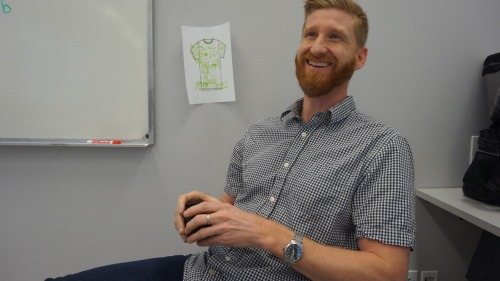
Dave is 40 years old teacher at ILSC. Born and raised in London-not the one in England, the one in Ontario-, Dave has lived in Toronto for 8 years and currently teaches English for foreigner students at our school.
Why move to Toronto?
“It’s kind of a long story I guess, but after I graduated from University I moved to Korea and lived in Seoul for 1 year.Then, I moved to Manila (Philippines) and stayed there for 9 years.So Seul has 20 million people and Manila has 15 million people, they are big cities. I didn’t want to stay abroad forever and I wanted to move back to Canada, but I didn’t want to move back to my hometown. After so many years of living in big cities, I wanted to continue living in a big city but still be close to my family.”
Whoa. Seul and Manila? What? We’re expecting something like “there are more job opportunities”. However, this obvious answer is not very far from his reality. Dave started teaching as a way to travel and, needless to say, to make money. Fortunately, teaching English was (and still is), for Dave, more than just making people understand another language, it is about connecting with new cultures.
“I liked being in Korea, but I didn’t like teaching kids. It was when I moved to Manila, to be with my girlfriend [Dave’s current wife nowadays], and started teaching adults, people my age like 22,23,24, that became much more interesting. […]I found some Korean owned English schools in Manila and that was basically my selling point. I think I learned more about Korea from teaching them than actually living in the country. […]After teaching Korean students, I started teaching Japanese students so I learned a lot about Japanese people and culture and that was also good…
Coming to Canada, then, you know, I never taught anyone from Colombia, Venezuela, Mexico, Turkey or Saudi Arabia. Having this opportunity became even more interesting and I think that is why I enjoy it.
Sometimes if I teach the same level every session people would say: “Dude, don’t you ever get bored?” No, because the students are always different and the personalities are different so they are the ones who makes things a little bit interesting every time, even if the book is the same. You can have really bad classes, could be the same book, the same material, and one session to another is totally different.”

What was the happiest moment of your life?
“I don’t know, that’s a tough question. I can’t think of any particular moment as the happiest.
Like I said, lived in Manila for a long time and got married in Manila, and then moved back to Canada. I don’t know if you know how the immigration process works […] In my case, I came here first and prepared all the paperwork and then sent to the government and six months later my wife was approved to come to Canada, so 1 month after that, she was here…That could be a happy moment.
So your wife is…?
“She’s Filipino. She’s a Canadian now because she took the test and became a Canadian citizen. That’s why I moved to Manila, to be with her. We’re together since 2001, got married in 2006 and moved back here in 2010.[…]It started as an online relationship. A lot of people are afraid of these things, but it can work if you make it work.
What is your love story?
“When I was in university, there was a chat program called ICQ. I wasn’t really looking for a girlfriend exactly, but I had a list of friends and one of my Canadian friends also had a list and I said ‘Hey man, do you have any girls in your list that I don’t know?’, so he sent me 3 contacts. I just wrote: ‘Hey, how’s it going?’ To the 3 anonymous girls and only one replied.
We just started chatting and I wasn’t looking for a girlfriend, she was in the Philippines and I was in London finishing my university degree. The timing was complete opposite: I would wake and it would be nighttime for her and then she would wake and it would be nighttime for me. We would talk about random things.This was like May of 2000, and then in October, I moved to Korea to teach.
Our chatting became phone calls because now we were in similar time zones, we started talking on the phone a little more and I said ‘I gotta meet this person for real’. In January of 2001, I decided to go to Manila to meet her and to see if this was something real.I stayed there for a week, and there was something more just than chatting and more than just phone calls. I went back to Korea to continue teaching and then in May of 2001, went back to Manila again to meet her again and decided: ‘okay, at the end of my contract in Korea, I’ll be back to Canada to say Hi and Goodbye to my family and friends, then move to Manila and try to find a job and a way to stay there’.”
And the rest we already know, he found a job at Koreans owned English schools. In fact, he got hired only 4-5 days after he moved to Manila.
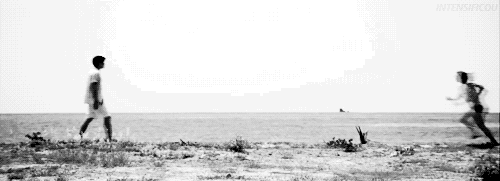
One “Hey, how’s it going?” message led Dave to his wife. Led him to another country for 9 years. Led him also to understand that students can sometimes teach you more than you teach them (but, of course, in different ways).
“Because of my experience teaching Japanese students, I became interested in Japanese culture and Japanese people and then decided I wanted to visit Japan. I asked my students if they could teach me ‘survival’ Japanese just to enjoy Tokyo a little bit, and they agreed for free just to give me some private Japanese lessons after our English classes. […] When I went to Japan, I was able to use the language and they could understand me and I felt really encouraged.
When I moved back to Canada, I didn’t really have anyone to practice Japanese with anymore, so I stopped. That was about 8 years ago. I still remember somethings, but I’m not as strong as I used to be.”

What are you most afraid of right now?
“My mom is alone. She’s doing okay, I guess, but you never really know. She was a nurse for 45 years and couldn’t quite retire, just wanted to keep working.Now that she retired (about a year ago), she doesn’t have that kind of social environment anymore where she’s going to work all the time so she spends a lot of time at home. She visits my sister a lot, so that’s good. But I worry about her, like, she’s in London and it’s a little bit hard to visit all the time. The good thing is she can visit my sister and her family a lot.[…]In a sense, she’s like me and I am like her, she’s used to her work friends, but she doesn’t like being part of large crowds…She’s good in very small groups, but to meet new people suddenly, it’s a very hard thing for her to do.That’s one the thing that I worry about the most: to make sure that she’s doing okay.”
Who is the most influential person in your life?
“I like to think that my mom might be a strong influence, she’s a very strong woman, she had to deal with a lot and worked for a very long time…It would be nice to model my life a little bit like hers. But at the same time she’s a little bit stubborn sometimes, she’s the type of person who doesn’t want to ask for help because she is supposed to be the person to give the help and never to receive. She doesn’t want to put a burden on someone.
My wife too, she’s a much better person than I am. She doesn’t gossip about other people, genuinely cares about other people, she never says anything bad about anyone…I mean, it doesn’t mean she likes everyone, but she doesn’t want to bring to that kind of negativity. She never makes any mistakes. I make a lot of mistakes. Yeah, she’s a big influence, It’s good to have someone like that in my life.”
And lastly, our final question to Dave was:
Which piece of advice would you give to your younger self?
Probably: “Don’t wait for tomorrow”. There is always going to be a tomorrow and if you just keep waiting suddenly 10 years go by and nothing has happened. If you want to do something, just start, even if it’s something small and you wanna build something else, little by little, just start.[…]I do have plans to do other things than just teaching, 5 years ago I started studying Accounting and I have been doing that for 5 years to move on and try something else with my life.
I remember I was at a wedding contemplating this situation, “Should I do it?Should I study Accounting?” And then my friend was like “why not? Just sign-up. What’s the worst that can happen?”. Little by little I have been doing it, and now I’m coming very close to the end of this process.”
And that was Dave’s story. Dave did not wait to live his life to the fullest: going abroad to the other side of the world to teach English, meeting this amazing woman he only talked to online, going back to studying at university, learning a new language…Like he said, there is always going to be a tomorrow.
Life is not to be “waited”, but to be pursued.
1 note
·
View note
Text
Sun Myung Moon speaks: “Famous actresses gamble, lose money then fall into debt ... then are forced to sleep with men.”
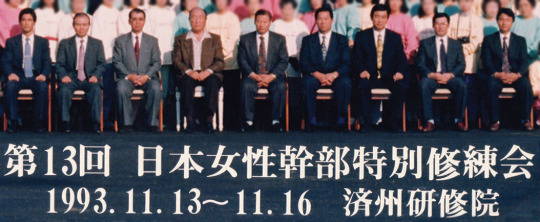
▲ Ken Sudo is seated second from the left, and Sun Myung Moon is fourth.
Moon: “True Father brought 50,000 Japanese WFWP leaders to Cheju Island. Each brought $10,000 so the total was $500,000,000.”
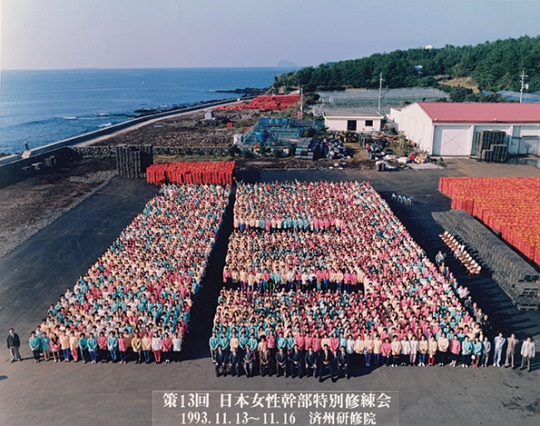
▲ The 13th of the 25 workshops held on Cheju Island Oct. 6- Dec. 22, 1993.
__________________________________________
Sun Myung Moon
Hannam Dong, Seoul December 30, 1993
These are unofficial notes.
Sun Myung Moon: “… When True Father started the U.S. tour David Koresh had committed suicide with 30 followers [in April 1993]. It was the worst time to start, when looked at horizontally. True Father’s attitude was “if you compare me with Koresh, we’ll see who is right.” Through True Father’s start True Mother got the confidence to go on and do a worldwide tour. …
Your nations are not the Fatherland, but Satanic nations. Now the battle of the New Testament Age is over, the Completed Testament Age has begun, centered on Adam’s family. The World under Satan’s domination is doomed. We have established a worldwide Adam’s Family tradition and culture. We need a homogenous race. Those first class nations have a tendency to look down on colored people. They are doomed if they keep that attitude. When the Unified World nation is established, your nations will become states of that nation. There will have to be a central authority. The Uruguay round is helping advanced nations. That must be changed. Also there must be no national immigration barriers. True Father told the Washington Times that AIDS sufferers should be isolated and also that they should speak against barriers to migration.
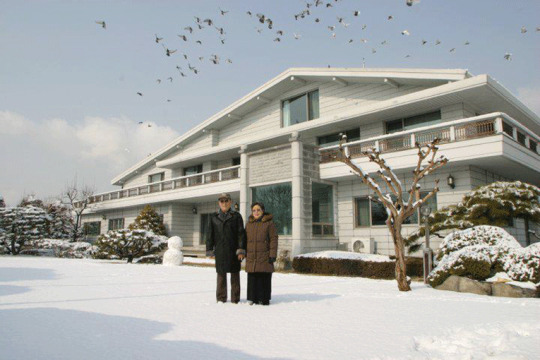
▲ Sun Myung Moon and Hak Ja Han at their Hannam Dong mansion in Seoul.
True Father wants to establish tight control over the United Nations. The Inter Religious Federation for World Peace (IRFWP) is the religious U.N. (This is the mind.) The existing U.N. is the body. The Women’s Federation for World Peace (WFWP) represents women’s body. There are three U.N.s, True Father works with all of them to bring world peace.
Once True Father establishes a tight grip on the U.N. it’s much easier to control than any individual country. All big countries will have to come under that umbrella.
Eve took Cain and Abel and betrayed God. At the end of the New Testament Age, restored Eve must embrace restored Cain and Abel and bring them back to God. That’s why these three types of organization connected to the U.N. are so significant. They need Godism. Now that nationism is over, a block system is coming in (the European Union, NAFTA, South America).
In Europe there’s still a struggle between Protestantism and Catholicism – it’s reflected in North and South America. Once Protestantism and Catholicism are valued in Europe, those other areas will be affected. That time is coming soon. That’s why True Father needs the U.N. under his wing.
True Father wants you to understand the direction that True Father is leading you. So do your absolute best to promote the WFWP and True Mother in your country. Be desperate to build the kind of foundation where True Mother can rule your nation. By the year 2000 enough foundation must be made.
… The entire world must be under True Father’s wing. To do this we need the strongest possible WFWP organization all over the world. Politicians need support so go round to large organizations. First Ladies will go to the U.N. as their nation’s ambassadors. In one week they would agree to a religious committee.
The U.N. has a $2.5 billion debt. Also, it doesn’t have good manpower. Also U.N. colleges around the world are ignored as there is no U.N. university in the U.S. True Father wants to use the University of Bridgeport to educate the world elites, getting cooperation of Ivy League Universities. The Unified World is around the corner. So go back to challenge those in power in your nation. Drop all your old habits and have confidence that you’re the co-creator of God. Have guts. By watching True Parents performance of miracles, have confidence, go out and do God’s work.
True Father indemnified 4,000 years. Now is the time of liberation. Be on the same level as big shots in your country. We need many members. The time of individual level effort is over.
Media is the key. So far True Father didn’t intervene. Now you’ll have to move around the world.
Students can be educated by video. Language is a problem. We must make one world language. Only the Unification Church can do that. The language must have religious power. Korean is number one for structure, grammar, etc. Scholars have shown this. Your second generation must learn Korean, wherever they are. … The time will come when English will be banned. English lacks levels of honor, it’s too horizontal.
People of the future will not want to work in factories, but to travel around as they wish. True Father invented the concept of the hobby industry. People come and enjoy their hobby and gambling, etc. But gambling is mostly controlled by organized crime. True Father will establish a tourist structure. One team to enjoy casino gambling at the end of the week, all share gains and losses, a team activity. A casino should return 50% of the profit back to the players in the form of lottery tickets, not actual money.
We can learn from gambling to the extent that gamblers feel if I only had $100 more, I could make $10,000,000. We need that kind of spirit. Once Mafia moves out we can make true hobby industries. True Father investigated and figured everything out – even to the extent that it takes $5 - 700 to sleep with one of the famous dancers. There are special companies that do that but they are underground. Famous actresses gamble, lose money are helped financially then fall into debt. Then to pay off they are forced to sleep with men. …
True Father is building boats, making nets, etc. Now he’s thinking about fish farming. It should become hobby farming. People will have smallholding hobby farms and do their own vegetable growing there. That will stop urban areas growing and take people back to the countryside.
True Father has 3,000 acres in Texas, but plans to buy ten’s of millions more. …

▲ Crawford Farms, Texas. The Han Corp. bought the trophy ranch in 1992 for $8.1 million and sold it in May 1999 for $6.5 million. The Moons hardly used the 3,029 acre ranch. Over seven years Moon himself visited it about five times.
While True Mother was speaking over 77 days True Father spoke to 51,000 Japanese sisters. Many Asian countries were amazed that True Father could do this. If True Father didn’t do it the Japanese Unification Movement would have declined. True Father helped them.
True Father brought 50,000 Japanese WFWP leaders to Cheju Island. Each brought $10,000 so the total was $500,000,000. Now the Korean newspapers reported about it and True Father established his reputation as the richest, most powerful man in Korea.
Promote this kind of campaign in your nations too! Now it’s a hot story in Korea. It’s in many women’s magazines.
Seven jumbo jets came at a time and all the buses on Cheju Island were mobilized.
Dong-A Ilbo magazine reported in a two page spread that the Unification Church showed its almost omnipotent power and potential which cannot be taken lightly.
Cheju Island is perfect for hunting, fishing, sports centers and casinos – it’s not too hot and not too cold. …
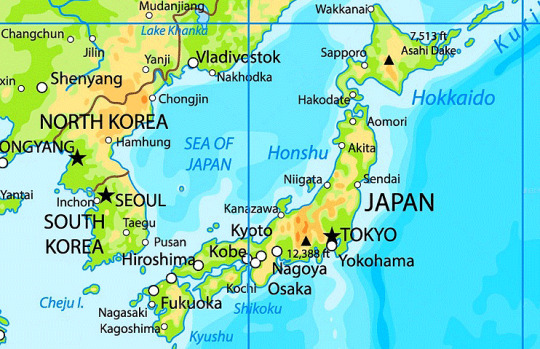
▲ Cheju Island is south of Korea and west of Japan.
True Father will establish a Headquarters to govern Japan from Osaka southwards, from Cheju Island.
True Father is investigating building a dock and establishing a place where 2,000 can fish at a time each day. …”
_____________________________________
Moon personally extracted $500 MILLION from FFWPU Japanese sisters in Oct-Dec 1993. He demanded that 50,000 sisters attend HIS workshops on Jeju Island and each had to pay a fee of $10,000.
Moon said “Japan would ruin if we failed to bring in the minimum of 50,000 sisters into this providential workshop.”
LINK
_____________________________________
Rev. Moon and the United Nations (extract)
By Harold Paine and Birgit Gratzer November 2001
_____________________________________
Sun Myung Moon:
“Dr Yang knows so much about Las Vegas. … When I go to Las Vegas I do not lose money. Maybe I should train a few people.”
July 12, 2010 East Garden
_____________________________________
“Rev. Sun Myung Moon: Emperor of the Universe” documentary:
Narrator: “Publicly Moon railed against gambling. But Nansook says he took her and the rest of his entourage to Las Vegas. An assistant would place bets for him. Did you say to him, ‘Father, I thought we were supposed not to gamble.’”
Nansook Hong: “No, of course not. Haha. If I wanted to die, maybe. No, no, we never raised any questions or doubts. We just had to be there accepting.”
LINK
_____________________________________
Moon sells Crawford Farms ranch in Texas in 1999 for a loss of $1.6 million. It was hardly used during 7 years.
Sun Myung Moon wanted to be Lord of 500 slot machines in Uruguay.
He already had dozens of slot machines in the casino he owned in the Radisson Victoria Plaza hotel in Montevideo, below.

#chejudo#Cheju Island#Sun Myung Moon#United Nations#exploitation#Family Federation for World Peace and Unification#Unification Church#Women’s Federation for World Peace#Crawford Farms
1 note
·
View note
Text
Four Reasons Why Jodeci are the Perfect Match for Golden Wind's Ending Song
One of the favorite traditions of new JoJo’s Bizarre Adventure seasons is trying to discern what the ending song might be; traditionally borrowing from non-Japanese music or anime original themes, the ending songs of JoJo seasons are chosen seemingly to match the setting, time period, or themes of the anime they’re attached to. Songs such as "Roundabout" by Yes, "Walk Like an Egyptian" by The Bangles, "Last Train Home" by Pat Metheny Group and "I Want You" by Savage Garden have capped off each episode in a perfect way. But the question raged before Golden Wind started: What would it use for its ending song? What song would perfectly fit, what singer or band would be the best choice? With episode 2, we got our answer: Jodeci’s "Freek’N You!" While this choice may have caught many by surprise, we’ve got a list here that will help you see why Jodeci isn’t just a great choice, but the BEST choice possible, and what connections this legendary R&B group have with JoJo’s Bizarre Adventure!
1. They both feature frontmen named JoJo
Ok, look, this one was a gimme. We’ll go into some other details more seriously below, but there was no way we’d pass up this particular similarity!
1. (For realsies): Jodeci’s "Freek’N You" and Golden Wind were both created in 1995
This may seem as flimsy as the first reason, but hear us out on this. Jodeci had by this time released 2 previous albums, and their musical sound and unique styles had a huge impact on the music scene that would evolve in the mid '90s and early 2000s. Hirohiko Araki is a consummate music fan, even having stated in an interview that he specifically listened to R&B and rap to get into the right headspace to create Golden Wind’s original manga. By the time he started Golden Wind, Jodeci’s influence on the music industry would be really hard to escape, and in particular the album that "Freek’N You" would come out on hit #2 on the Billboard charts for the year, meaning there’s a very good chance that Araki had heard of the group while doing his musical research and inspirations. For perhaps no other reason, though, the timing alone is perfect; the previous songs all correlate to the settings of their respective JoJo seasons, or to the years in which Araki created and worked on them, with Jodeci’s song being slightly older than Golden Wind by a few months.
2. Jodeci and Araki are both hugely influential artists that impacted their respective mediums
If you were born in or after the year 1999, you might not know about Jodeci (but your parents might have…), yet the group was a hugely influential R&B group that changed the music scene with their work. It isn’t incorrect to attribute much of modern R&B and even types of rap to “Jodeci Style”, with artists like Usher, Drake, and J-Cole drawing inspiration and influence to the foursome. Much of this came from the way in which Jodeci blended gospel, rap/hip-hop, rock, and new jack swing into their beats and songs. It would be hard to imagine what the modern R&B music scene would look like without the influential work of Jodeci!
Similarly, it is hard to ignore the huge impact Hirohiko Araki has had on the manga and anime industry during his career and work on JoJo’s Bizarre Adventure. Numerous artists cite Araki as an inspiration and influence, and JoJo references and parodies pop up frequently in all sorts of anime and manga works; Araki’s unique blending of shonen action, stylish art, and unique layouts and blends of cultural references had a huge impact on the manga industry, and he continues to do so today!
3. Jodeci’s R&B style matches the Gang-Star aesthetic of Giorno
Golden Wind is undeniably a mob style story set in Italy, so there were quite a few other songs people had expected as the ending theme song that dealt with gangsters, but in reality those songs don’t quite match the tone and focus of Giorno’s unique dream of gang life. In episode 2 we learn that Giorno dreams of being a Gang-Star, a leader who protects and cares for the people around them in a slightly romanticized and somewhat crazy-sounding dream of the mafia. While Giorno’s motivations can be debated later, one thing is sure: Giorno’s vision of a “Gang-Star’s Paradise” has little in common with the other paradise-themed song people envisioned.
Instead, the sensual and sexual themes of R&B, pioneered by Jodeci, match the glamorous lifestyle that Giorno envisions. Music videos for Jodeci, K-Ci & JoJo, and other R&B groups from the era place heavy emphasis on a smoky, sexy vibe that comes from a life of potentially questionable activities in darkened rooms, stylish clothing, and the grim realities of drug- and violence-laden gang lifestyles, such as in K-Ci & JoJo’s "Crazy."
4. Both Jodeci and Golden Wind broke the mold from the norm
As we mentioned previously, Jodeci were so influential to the R&B scene that their unique style birthed “Jodeci Style” that gets referenced even today with numerous artists sampling from the group. The group focused on songs about love lost and won, combining their gospel backgrounds with modern music trends and unique styles that hadn’t been seen before in such a combination, which made their work wholly unique and different. "Freek’N You" was something of an oddball compared to the rest of the discography; it featured some more...direct...language and desires, and showed the evolution of the group and their unique tone. Tupac featured K-Ci & Jojo in two of his videos, Notorious B.I.G. sang the first verse of "Freek'N You" that can be seen in the video for "Nasty Girl," and numerous R&B singers from Ne-Yo to Trey Songz owe much of their careers to Jodeci’s influences. While the group Boyz II Men might be more instantly thought of when it comes to '90s R&B, it was the harder edge and styling of Jodeci that really shaped the way rap and R&B would evolve following the '90s!
Golden Wind, meanwhile, presented a real departure for the JoJo series in a way that none of the others had really done since the start. The first four JoJo parts focused exclusively on the Joestar family line, from Jonathan to Josuke, and featured numerous returning characters directly involved in the Joestar family line. Giorno, however, is DIO’s son, living in Italy and far away from the Joestar line--Giorno's not “directly” related to them. Similarly, as we’ve seen so far, the Stand powers of Golden Wind are so far quite outlandish compared to the somewhat simpler Stands of Stardust Crusaders and Diamond is Unbreakable, with Giorno himself being a much more slender and elegant protagonist compared to the beefy Jotaro or Joseph, and even seems slightly slimmer and less aggressive than Josuke. Although Stardust Crusaders brought Stands into the JoJo world for the first time, Golden Wind takes the most risks and changes to the direct formula of the series, much like Jodeci did to R&B!
While the initial reaction might be that the song was an odd choice, we hope that our list has helped show you the reasons why Jodeci was not only a great choice to accompany Golden Wind, but why it was the most necessary choice. While other songs might have fit in some ways, Jodeci’s unique sounds seems the perfect mix for JoJo’s unique visuals and thematics, and it shows the breadth of Hirohiko Araki’s love of all types of music from various time periods! So next time you finish your JoJo Friday, turn the lights down low, light some candles, and let "Freek'N You" soothe your soul as you wait for the next episode!
What’s your thoughts on Jodeci x JoJo? What unique song would you have liked to see? Let us know in the comments!
----
Nicole is a features and a social video script writer for Crunchyroll. Known to profess her love of otome games over at her blog, Figuratively Speaking. When she has the time, she also streams some games. Follow her on Twitter: @ellyberries
5 notes
·
View notes
Text
Where Do I Even Begin?
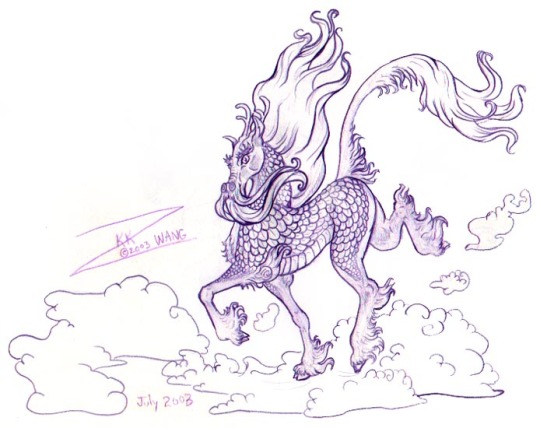
Well, first of all, I’ve LOVED LOVED LOVED Qilin ALMOST as much as I loved Unicorns, and Dragon. I say ALMOST because I first saw a unicorn on TV when I was 4 years old in the EARLY 1980s! But, I’d never even heard of a so-called “Chinese Unicorn” since about the mid-late 1980s when I saw a children’s magazine called “Cricket” which had a WHOLE SPREAD about UNICORNS, including the Chinese & Japanese versions.

(I don’t believe this was the actual cover. I can’t remember what year the Cricket Magazine issue was, just that it was in the 1980s. This issue was cited in many books written about Unicorns as well, following its syndication. It had a full on spread including many kinds of unicorns from many cultures... if I recall correctly, there might even have been an French Unicorn story as well.)
When I was a little kid, I actually didn’t like to read (which was an issue by the late 1900s, and even the government would talk about it, the trouble was they’d demonized comic books in the 1960s-1970s, which resulted in that problem, because even tho’ “correlation doesn’t equal causation” they didn’t know that and thought that the act of reading comics made you into a criminal. My experience was the exact opposite, because I read super hero comics a lot and was more interested in THAT than things like doing hard drugs, vandalism, and shoplifting which was rampant in NJ where I grew up.) So, by the late 1980s-early 1990s children were encouraged to read, read, read. Well, I liked pictures, and I LOVED: unicorns, dragons, and dinosaurs, ANYTHING FANTASY, but also Sci-Fi. (I also loved Marvel Comics/X-MEN, and Disney Adventures Magazine, and nearly all the Jeffrey Katzenberg hit Disney Films)
So, whenever it was something of interest to me, I would read a lot, and I had stacks of books, which I also used to practice learning art, and I was self taught. (I have A.D.D.)
I graduated in May 2001 from the Art Institute of Philadelphia (Majored in Computer Animation AKA CAM). And, by the GW Bush Era, I had already been active online since 1994, and had been blogging, and using many various art websites.
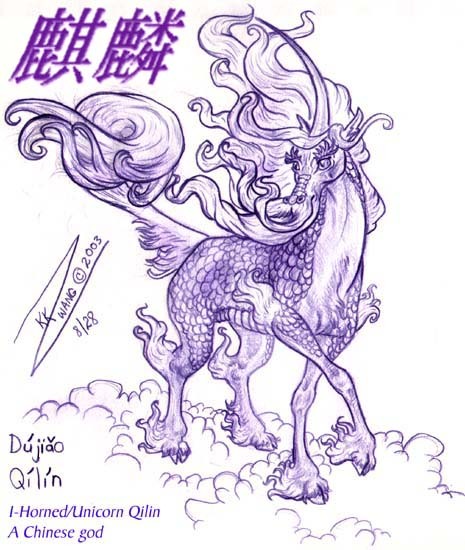
By late 2001, and most of the early 2000s (2001-2007) I spent months and even years sketching and drawing Qilin, interacting in the Furry/Anthro Fandom, and published a lot of my works to GeoCites/Yahoo, and had even created my own message boards, and so on. I even had one called “Qilin Savanna” Altho’ much of these sites are gone, my original works still remain on DeviantArt in my gallery HERE. (I also LIVED IN CHINA many times in the GWB Era often.)
Since that time I’d also written a lot of things, multiple times over, about my research into Qilin (which are not all unicorns, just some).
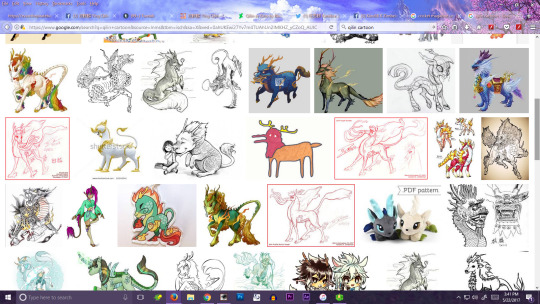
If you were to type in “qilin cartoon” into Google you can actually see the many many photo images that come up since the time I’d first started publishing my work ONLINE, FOR FREE, you can actually see how my works have influenced people. Back then, there was a MAJOR mix-up with the term, because MOST information available in ENGLISH regarding CHINESE EVERYTHING was often inaccurate, used the dead Wade-Giles Chinese language, or were often confused with JAPANESE. Another issue was that I actually could speak standard Mandarin Chinese, but many people wrote the Cantonese names, or FREQUENTLY confused them with Japanese name for the exact same character (AKA kanji, AKA Hanzi), which is “kirin” in Japanese. Also, the majority of NON-Chinese speaking persons don’t know how to pronounce Mandarin pinyin. (Example: Can you pronounce?: chi, qi, shi, xi, zhi, zi, qu, chu, er, ri, ren, si, ran, yu, you, bo, po, zhou, zhu, cao, zui - Most Non-Chinese speakers CANNOT pronounce these correctly at all. “Chi” sounds like “Tcher” and “Qi” sounds like “Tchee”, “Shi” sounds like “scher” and “xi” sounds like “schee”. There are also variations on pronunciation.)

But, I still stuck to the facts. my father-in-law in China,The late Wang Zimin, actually had special access to a restricted library, and wrote letters to me about Qilin, and the 4 major Chinese magical deities: Qilin, Long/Dragon, Fenghuang/Phoenix, Bixi/Dragon-Heard Tortoise.
Back then, mostly you needed to search “kirin” especially because M. Peña called her artwork “Kirin” but still also called them “Chinese Unicorns”. Her gorgeous sculpture works were sold everywhere for years, nation wide, from the boardwalk to Spencer Gifts, to Flea Markets, and Christmas season mall kiosks.
But, as you scroll through all the works produced since that time, not only the ones titled or tagged as "kirin” but over time “Qilin” starts to replace this as more and more people growing up actually start to study Chinese, especially artists and customers, and many of these young artists are either my fans or students, but fans or students of my students... after a while, people forgot who I was... but my work BECAME PART OF THE CULTURE.
You can SEE that many people emulated my poses, my styles of doing hair, and many other details. Over the years, a number of my fans, and friends would send me private messages FREAKING OUT that either someone stole my work, stile my style, or ripped me off...
That’s actually NOT TRUE. No one ripped me off. THOSE ARE MY STUDENTS.
You guys ASKED ME things like: How do you draw _____? so I made countless cheat-sheet style tutorials (because paid classes don’t ACTUALLY TEACH). Also, if someone wants to learn, (like myself) they try to draw from WHAT THEY LOVE. That means ME. MY ARTWORK. How else will they learn if they don’t copy, ask questions, etc.?
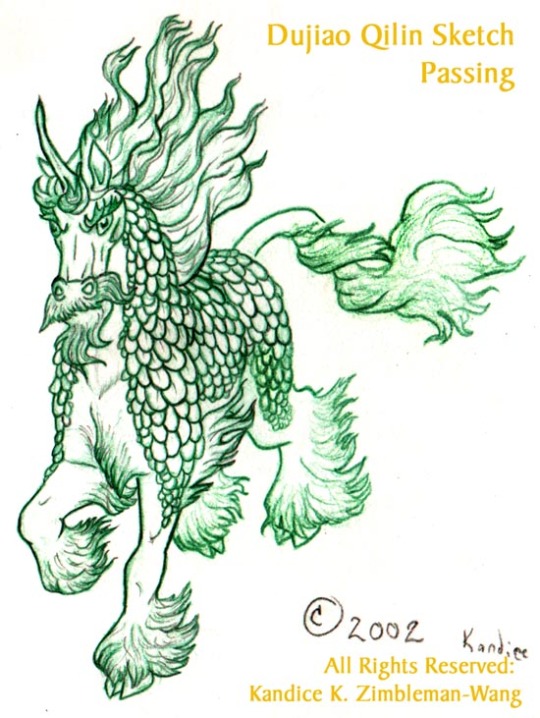
I have many many open source materials in my DeviantART gallery (which are STILL MY MOST POPULAR WORKS OF ALL TIME despite the hours of work I’ve produced artistically.) I have also licensed much of my line art works FOR FREE for people to practice coloring with wither digitally, or to print them out and color with real media like markers, color pencils, pastels, or whatever because people kept asking me.
Actually, I would like to credit a number of artists whom are my biggest influences as well:
Susan Dawe
Glen Keane
Alan Davis
Those are my biggest ones, but I also loved artworks by Burne Hogarth, Auguste Rodin, Edward Degas (I especially love his ROUGH sketch work), Frank Frazzetta, Boris Vallejo & Julie Belle, Fred Moore, Vladimir “Bill” Tytla, AND the film The Last Unicorn was especially the #1 thing that got me actually DRAWING when I was 4 years old.
SO much of my work, especially ANYTHING with unicorns, has been tattooed onto people bodies. Many people personally asked my permission, but I honestly DO NOT MIND. I have found over the years more examples of my artwork tattooed onto people than I can count. It’s LOVE.
However, I’ve also many many times been the victim of theft FOR REAL. Many people have tried to rob my sketchbooks, and many companies have illegally robbed my artwork online. It was the cause of MUCH online fights, wars, and battles. There’s also impersonators: People pretending to be ME, or claiming THEY did my work: also the cause of much much online fights and flame wars.
-Then, of course, there’s LOTS & LOTS of kids online that “rob” my work for RPGs, and fan pages... Honestly, I’m NOT going after children, or fans, for harmless things like that... I’m NOT Metallica.
So, where am I going with THIS?
Well, for one, there’s both ART and PHILOSOPHY which are BOTH a MAJOR part of my life.
I had a number of setbacks, delays, and many other strings of very unfortunate events in my life. Needless to say, I was very depressed. However, I did find myself back in college, first for Philosophy, and then for Art, especially Video... which somehow saw me thrust forward into Animation HEAD-FIRST. Suffice it to say, I’ve worked through, blew threw, and past, all of my blocks, and have been doing animation again. (lots more long stories, but not writing them here)
Many many times, you can’t always reach, yet, what you want. Other times, other persons, or groups want to change you, or make you something else.... and not you. But, it kills you inside...
At some point, you need STOP listening to everyone, and everything else, ESPECIALLY if that’s not FLOWING in the direction are are INSIDE.
I’d already WANTED to produce at least 2 series/films of my own. (”Eyewitness” and “Zenith Beyond The Dragon’s Rue”) Well, THIS is a branch off that tree. This stems from my concepts for “Eyewitness” but sort-of... I had ALWAYS wanted to produce my own small animated shorts, especially with music, like the old 20th Century animated works such as “Silly Symphonies”, “Merry Melodies”, and even Disney's “Fantasia”, but also a number of influences from Far East Asia including PR China, and Japan.
I’ve been multiple times inspired by Socrates, Plato, Laozi, Bruce Lee (Li Xiaolong), and many fusion artists/dancers on the American West Coat including my teachers: Zoe Jakes, and Alyssum Pole, as well as Rachel Brice, Carolena Nericcio, Jamlila & Suhaila Salimpour, but also Matahari, and Kerli Kõiv. People that think differently, question things, or create their own ideas, or even fusion artists.
Well, this project has been on my mind since at least 2001.

In fact, my actual name (Ming Zi) in Chinese is: 任思麒 (Ren SiQi)
It literally means: Duty/Task [to] Think/Contemplate/Dream of Qi[lin]!
Also, as an artist, there are a number of things I believe in, whereas other things I’ve shed like a snake molting its skin. I’m a fusion artist, an eclectic artist, but I still firmly believe in art fundamentals like life drawing, practicing one’s skills, and I use bot digital and real media. I LOVE TO DRAW. I firmly believe in Quality OVER Quantity, yet, in some instances I also think too much detail is overdo, and somethings look better less refined. I like realism, stylization, cartoons, and beautiful things.
I want to create content that is LESS about “being a big success” or ego driven ideas of “stardom”, and lavish money making, but more about THE LOVE OF IT.
I do NOT want to be part of any establishment groups, crowds, clubs, or institutions, and DON’T want to be mainstream, NOR corporate. I have found all of those things to be negative and destructive to my life and therefore regret pursuing those avenues. I’m NOT interested in walking those paths, nor dunking helplessly into those turbulent or stagnant flows, but RATHER Flow my own way, because I have my OWN PATHS. I don’t need to buy their metaphorical light bulbs, because I have my own light that I can shine inside of me.
And, if I am being completely frank & honest, another MAJOR influence on me WAY BEFORE HE WAS EVEN POPULAR was Bernie Sanders. I am a Berner. Sanders actually GAVE OF HIS HEART & HIS TIME FOR FREE. He crowd funded for what he believed in with SMALL MONEY because he was against BIG MONEY.
I have no care for being in exclusive film festivals or galleries. People whom already LOVE my work find their way to it. People HAVE found value in my efforts and work.
Therefore, I wish to begin producing this animated short. It is not cheap tho’. But, I will gladly share my process, my concept work, my practice work, and everything FOR FREE. Free to ALL ARTISTS, and people whom just live beautiful things, art, and QILIN.
I wish to pursue an independent direction in my art. But, I would very much like to include people, if not the world or those in it that care about these things, to interact with me. A long time ago I’d created my “Qilin Savanna” site to interact with people whom also loved Qilin, Unicorns, Dragons, and other things, but also a love for art, or learning art.
This year (2017) while interacting with MANY MANY young people, and young artists, I often found that people WANTED to learn to DRAW, to improve their techniques and practice them, but despite having paid money to attend art classed (including “drawing classes”) they did not actually get what they paid for, did not actually get instruction for what they wanted to learn, but either had to fend for themselves, try independently, or got resources online for free... so, why then were they paying for it?
I have many many times, spent just a short moment with frustrated peers, students, classmates, friends, and fellow artists whom couldn’t draw what they wanted to, and teased me for being some kind of special person... when in fact, whatever I do, others can too. I sat with them, explained, and demonstrated (AKA Using The Feynman Technique) and after that moment of AHA THEY COULD DO IT. And, they didn’t need to come back.
I did THAT FOR FREE.
I did THAT FOR LOVE.
And, NO, I DON’T HAVE A MASTER’S DEGREE. Honestly, at this point, I don’t feel I actually want one. I DON’T want to be a part of that club, nor establishment either. In this way, I’m somewhat like Socrates, Diogenes, or Bruce Lee... only NOT. I’m ME.
I have a lot more to say, but I think I will leave it here for now.
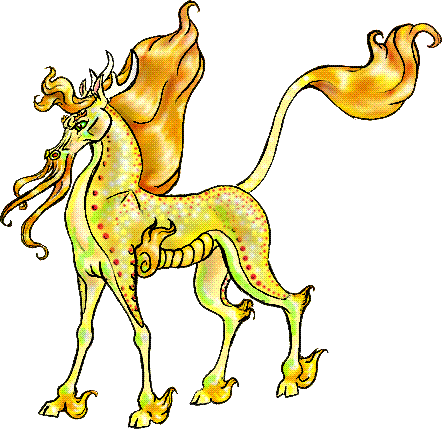
#qilin#kirin#Kylie#Chinese unicorn#animation#cartoon#drawing#art#Kandice Zimbleman#Black UniGryphon#BlackUniGryphon
4 notes
·
View notes
Text
Mason Soiza | The Potential of the Third Generation of Tech Business Owners
A Passage from guide Absolutely no to One Million: Just How to Develop a Business to One Million Dollars in Sales
Given that the start of the technology age there have actually been 3 generations of entrepreneurs. The first generation consisted of people like Oracle CEO Larry Ellison, EDS billionaire Ross Perot, as well as of course, even Bill Gates, now over 50. These guys "got it" in the past prior to the Internet. They were the "improvement business owners" and were important in bringing the USA right into the Information Age.
Next off on the scene were the guys as well as women that matured with Commodore 64s, Atari, and Ronald Reagan. From this initial type of Net Age business owners came individuals like Jerry Yang, Chief Executive Officer of Yahoo!, Pierre Omidyar of ebay.com, and also Jeff Bezos of Amazon.com. All born basically in the late sixties, these individuals matured watching the growth of computer systems and were prepared to jump on the opportunity they saw in late 1994. They succeeded, and also their companies tripled and quadrupled every year from 1995-1999. These men were the frontrunners and also were smart sufficient to see the possibility of the Web twelve or thirteen years back, maybe the reason that all three of these companies are still around today.
There is a brand-new breed of business owners that is already beginning to make their mark on our globe. I are just one of them. We are the eighties generation. We are as the songs group SKIN states, "The Young people of the Country." While yes, there are a number of us who are disillusioned, passionless, or depressed; I am seeing today something really remarkable. There is a subculture of young people in both the United States and also in every nation on the planet that gets it.
I am extremely fortunate to have contacts in about forty countries. In 2000, I was fortunate sufficient to obtain a scholarship to take place a 53-day expedition to Spain, Florida, New Mexico, as well as Mexico called La Ruta Quetzal. On this journey I met three hundred fifty students from forty-three different countries. It has actually absolutely been priceless to be able to have these calls. As an example, during the Argentinean financial collapse in early 2002 I had the ability to jump on my computer and email Ana from Buenos Aires to see what the actual circumstance was like. When a UNITED STATE spy-plane was shot down in China in April 2001, I was able to email my good friend Sonsoles in Beijing to obtain her take on the incident and her thoughts on what Jiang Zemin would certainly do.
During the Globe Cup in June of 2002 I had the ability to chat cope with my friend Kevin in Dublin as he grieved over each missed penalty shot in Ireland's overtime removal defeat to Spain. For the pre-1980 people reading, would certainly it not have astonished you when you were seventeen to have had the capability to conversation live from Florida with your close friend in Dublin while both seeing the very same charge shot being taken at the specific same time in Seoul, South Korea?
Mason Soiza
This brand-new type of entrepreneurs, also if we all do not yet completely grasp the effect of globalization and just how essential the modifications that are taking place today truly are, are either undergoing university today or will certainly in the following five years. The study they will certainly have in Financial Management 202 will not be the primary mathematical bores they possibly were for several in their college days of old. They will be captivating tales of unrestricted riches, power, as well as development; in many cases collapse and scams and in others amazing success.
I claimed a few paragraphs ago "there is a subculture of youth in both the USA and in every country worldwide that gets it." But what it is that we get? We comprehend the following eleven principles:
1. The world is international as well as interconnected. A negative economic record from one nation can ruin the economic situation of a continent overnight, a trillion bucks can leave a country with the click of a couple of computer mice, and an explosion in Shanghai can cause bond costs in London to jump 10% within a hr.
2. Anybody with $1000 and some knowledge can either make a billion dollars or damage the globe.
3. In our economic prosperity, we must make every effort toward creating a sustainable presence otherwise the end of our lives and also our kids's lives will be years of difficulty and sacrifice.
4. Academic education and learning is essential, yet at all yet the most effective schools, a scholastic education will not give one the understanding required to be economically prosperous. As Thomas J. Stanley specifies in The Millionaire Mind, having a 1000 or 1500 on your SATs has no connection to your likely total assets in twenty years. Just as essential, if not more, is one's education and learning outside the classroom.
5. If one is going to come to be extraordinarily well-off they better have integrity, principles, and also maintain their bookkeeping sincere as well as precise.
6. The globe is mosting likely to alter in remarkable ways over our lifetime.
7. Open market economies are necessary to a high standard of living. An incentive system is required to get workers to work and also a rate system is required to effectively assign a minimal supply of resources and also products. Competition is essential to maintain every person straightforward and functioning efficiently to generate the optimum result with the minimal input. Although some think commercialism produces inequities and also is unethical, it is a few of the individuals within this system that cause these unfair injustices. This absence of honesty among some participants will certainly always be present. Nevertheless, as a result of intelligent regulations, guidelines, oversight as well as the integral favorable residential properties of the market coupled with freedom such as openness, liberty of the press, and also a far better educated proletariat this ethical problem is much better currently than in the days of centralized possession of resources and also tyrannies. Given that there is no motivation to earn a revenue or innovate, state-owned business usually reproduce ineffectiveness.
8. Nevertheless, without honest, ethical, and thoughtful people at the helm of an autonomous and also market system, or the proper legislations and legal establishments to guarantee this integrity, this system is no much better than totalitarianism, autarky, or anarchy. Additionally, we have to constantly take concept number 3 right into account.
9. For success to infect establishing countries we should not look to short run potions. It took 175 years to turn the U.S. into a financial superpower. The same modification can not take place in Somalia, Zimbabwe, or Afghanistan without the appropriate growth of human funding, commercial funding, and a fundamental lawful framework.
10. It is not he who functions the hardest that does well; it is he that has the best suggestions, collaborates with one of the most knowledge, and constructs the right team to aid him achieve his goals.
11. The capacity to adjust to transform and also capacity to discover quickly is as important as what you recognize today.
Those that do not understand these concepts will have a hard time ending up being successful or developing a thriving business. While the large majority of American young people do not (at the very least yet) have the faintest concept of what these concepts are or what they imply, there is an expanding minority that does. While progress is being made with the aid of companies such as Junior Accomplishment, the public additional academic system of the United States, in lots of places, at times seems that as opposed to instructing the above principles it is showing students to be provincial, closed-minded, economically-challenged, and also financially inefficient. It almost appears if trainees in the American education and learning system are taught from 1 st via 12 th quality to believe that the U.S. is the only nation on the planet, the only one that matters, and that our goal after we leave school must be to look for a safe and secure well-paying work. These concepts will certainly not create the vibrant trendsetters and leaders needed to take on the problems of this new century.
Nevertheless, there is an expanding minority of young people in the U.S. that does recognize the globe, globalization, a bit of background, and the fundamental principles of business and economics. More significantly, the eighties generation throughout the majority of the remainder of the globe is not so provincial. On my 2000 Ruta Quetzal Exploration I was humiliated to just recognize 2 languages. Most of the participants, all just fifteen as well as sixteen like I, understood a minimum of four languages, and some knew as numerous as 6. They not only recognized the languages, however they comprehended the culture of whomever they were talking with, whether they were Japanese, Swedish, Colombian, American, or Malaysian. The globe is growing smaller sized by the day, and also anyone who does not recognize world society, talk another language, or grasp globalization will have a glass ceiling in their career, in their life, and in their service.
There has actually been some terrific development on this front just recently. Books such as The World is Apartment and The Lexus and the Olive Tree by Thomas L. Friedman, The Commanding Heights by Daniel Yergin and also Joseph Stanislaw, Rich Father's Overview to Investing by Robert T. Kiyosaki, Globalization as well as Its Unhappiness by Joseph E. Stiglitz, and also Transforming the Fete by John McMillan enlighten us all.
This new breed of entrepreneurs did not grow up with 15% inflation, the Commodore 64, or Ronald Reagan (although I did love to play my Space Intruders video game on my utilized Atari when extremely young). Instead, we have actually matured with Nintendo as well as Sega Genesis, MTV, Expense Clinton, the World Profession Facility assault, as well as most notably, the Internet.
I was eleven, not twelve and also not thirteen, however eleven. It was 1995 and I was aiding people who were 40, 50, 60, 70, 80, and also 90 learn to utilize their computer, send out e-mails, search the web, as well as write a letter without a typewriter. More often it is the 4 years of age that is showing her father how to connect a photo to an e-mail, or the 7 year old showing his uncle how to burn a CD, than the various other way round.
Right now I am 21. Any person my age or more youthful will recognize what I am about to claim. I do not recognize what the world resembled prior to the Web. Let me repeat this-- I do not know what the world was like prior to the Internet. Yes, yes, certainly I have memories before 1994, however to be truthful I truly didn't comprehend just how the globe worked at that time. I did not check out the paper frequently then and also just hardly ever enjoyed Tom Brokaw or Dan Rather. I have grown up to recognize routers, Intranets, FTP access codes, HTML, and also ecommerce.
This new type of entrepreneurs; the investment lenders, experts, financial experts, alternatives traders, political leaders, business owners, leaders, as well as entrepreneurs of 2005-2065, understand technology and also they use it every hour of their waking lives.
We comprehend the above eleven principles. We understand we stay in a global interconnected town. We understand the government will likely not be able to deal with us in old age. We know we must be responsible for our education and also our financial health. We know that there is extreme suffering, sacrifice, and also corruption in several components of this world that will certainly not stop unless we throw down the gauntlet. We recognize technology and recognize the adjustments that have happened in business and also business and economic lessons that have been taught to us over the previous five years. In order to build an effective organisation you will require to recognize these things.
This new type will certainly not be a typical, typical group. As long as we can avoid collapse in the Middle East and Southern Asia, a third world war, and also safeguard the enlightened globe from the harmful strategies of those whose objectives may be well-meaning but whose ideas are based upon half-truths as well as fatality, the world is our oyster. Who is to state that my generation can not create a much more efficient way at ensuring necessary nutrients and also enough food gets to those in requirement? That is to state that we can not increase the standard of life in my lifetime or consign absolute hardship in developing countries to the dustbin of background?
This brand-new generation is currently doing exceptional things. Simply review this excerpt from the May 29, 2002 concern of Business Week:
Never prior to have teens had the know-how, the gain access to, as well as the devices at their disposal to seek organisation on an equal ground with adults. The variety of teens doing some type of business on the Net is currently a whole lot bigger than many grownups would ever expect. For each teenager millionaire, there is a genuine throng of routine youngsters who regularly make spending money doing software program work through the Net. It's difficult to determine exact numbers, however they are big. Scientist Computer Business Economics Inc. in Carlsbad, Calif., estimates that 8% of all teenagers, concerning 1.6 million in the U.S., are making a minimum of some cash on the Web. "There's not a period in history where we have actually seen such a wide variety of young business owners,"claims Nancy F. Koehn, associate professor of service administration at Harvard Organisation Institution.
The write-up takes place to talk about teen entrepreneurs that have actually made hundreds of thousands or millions of dollars over the previous six years by producing popular website, creating software application, as well as seeking advice from for businesses. Directly, in my very own collaborate with the Carolina Entrepreneurship Club and the Collegiate Business Owners Organization I have actually come into contact with several fellow young business owners. It seems to me that numerous in our generation certainly do recognize the terrific opportunity we have and the unique time we are in. Regardless of what your age is, if you can discover these very same concepts we have discovered, you will greatly increase your opportunities at developing a successful business.
In the coming decades, new leaders will appear that have actually matured with technology belonging of their lives for as lengthy as they can remember. This brand-new generation will intrinsically understand the principles of a global world and also be far more reliable in developing effective firms than anyone who does not. Whether or not you remain in this generation, you better comprehend these concepts.
In 2005, I was called as one of the "Leading 25 Business owners Under 25" by Company Week. Each and every single among these business owners was birthed in the 80s and becomes part of this Third Generation of Tech Entrepreneurs. I wish you'll get to know us. We'll be around for rather a long time and also we'll have an unmatched chance to affect positive adjustment in our world and culture for the next six decades through both traditional and also social entrepreneurship. I think I know us all right to be confident we'll not allow the chance pass us by.
0 notes
Link
Jim O’Rourke is searching for a word he’s forgotten how to say in English. After more than a decade living in Japan, the experimental musician doesn’t speak his native language much anymore and warns me at the beginning of our interview that he may occasionally have trouble. He’s trying to describe his new album, Sleep Like It’s Winter, and he’s pretty sure the word he’s looking for is not “exhume.”
“Express!” he says after working his way backwards with an online Japanese-to-English translator. It’s a significant word. Pick nearly any genre and O’Rourke can express a deep knowledge, critical understanding, and sly humor. But generally, he likes to let his music do the talking. Curious about his thoughts on guitar rock? Listen to 2001’s Insignificance. Americana and folk? Bad Timing. Classic pop music? Grab Eureka — and if you enjoyed that Burt Bacharach cover on it, well, he made an entire album of them. His latest is being called an ambient album, but he sees it more as an album about ambient albums.
For many, O’Rourke is best known for his work with other artists. You’ll find him in the credits of records by foundational indie artists such as Bill Callahan, Stereolab, Superchunk, Brainiac, and Joanna Newsom, as well as experimental legends Faust, John Fahey, Nurse With Wound, Tony Conrad, and Keiji Haino. As a producer-turned-member of Sonic Youth, he was key to their 2000s renaissance on late classics like Murray Street. And of course, there’s Wilco’s Yankee Hotel Foxtrot, a record as much myth as music due in no small part to his presence.
None of those artists come up during our hour-long conversation. They’re other artists’ stories and O’Rourke prefers the sidelines even in his own career: Interviews are rare, live performances even rarer. Yet O’Rourke subverts the trope of the reclusive musical genius, and the last few years have actually been some of his most prolific. This spring, he released the 40th album in his Steamroom series. Though it started in 2013 as a place to put archival material, Steamroom has evolved into a sort of sonic diary. In 2015, he returned to Drag City with Simple Songs, a collection of hilarious, cynical, and immaculately recorded pop tunes, and he continues to make collaborative releases with longtime friends such as Fennesz and Oren Ambarchi.
During our talk, O’Rourke offers rare insight into works old and new — from Sleep Like It’s Winter to his legendary ’90s post-rock duo with David Grubbs, Gastr Del Sol, to his favorite lyric and the one record he wishes people liked more. Like his music, he’s sharply intelligent, hilariously self-deprecating, and leaves you feeling like you’ve only scratched the surface.
STEREOGUM: Are you at home?
JIM O’ROURKE: Yeah I’m at home in the studio, now that I have a studio.
STEREOGUM: I read you had to move your studio after the earthquake. How do you have things now?
O’ROURKE: When I lived in Tokyo, the second floor was where I worked, and the house got … it got kind of … you have to excuse me occasionally, I don’t speak English very much anymore. [Laughs] It became too unsafe to have the stuff up there. But I moved out of Tokyo just under two years ago. I live in the countryside where you can probably buy a block of buildings for the same price. I have something that is more like an actual studio now, although it doesn’t look like it yet. It’s still a mess. I’m about two hours outside of Tokyo in Yamanashi. It’s near Mount Fuji and all that stuff. It’s up in the mountains.
STEREOGUM: How did this new album Sleep Like It’s Winter end up on Newhere, which is a very new label?
O’ROURKE: I’ll make the long story short. The label Newhere, the mother label, or whatever you would call it, is this label called Felicity here and they’re the label that puts out Eiko Ishibashi’s records. I don’t know if you know her.
STEREOGUM: Yeah, I enjoy her records.
O’ROURKE: I’ve produced all of Eiko’s records on that label so I knew [Newhere founder Hiroyasu] Hirakawa from Felicity. So the other side of the thing is people don’t really use things like Bandcamp in Japan because Paypal is near impossible to use here and just the culture of download music isn’t really what it is overseas. People still buy CDs here. Everything’s about CD still. So he wanted to start this label and he was like, “People here aren’t hearing the things you’re putting up on Bandcamp and I want people to hear those things.” It would have ended up there otherwise, but I made it specifically for him. It wasn’t like, “Oh I got that thing I was about to put up on Bandcamp.” I did work on it for about two years.
STEREOGUM: Wow.
O’ROURKE: He said, “We’re starting an ambient label,” which got me going down the rabbit hole of conceptualizing the record for a much longer time than I usually would. Usually I give myself the problem to deal with, but the fact that somebody else was giving me a problem to deal with made it take quite a bit longer.
sleep like it’s winter by Jim O’Rourke
STEREOGUM: How would you say this album differs from some of the Steamroom releases?
O’ROURKE: I think the main difference was this certain stimulus, this problem that I had to pose myself was coming from an external source, which really made me feel on the hot seat more than usual. Also, that’s not anything I would have challenged myself with, like what the hell does it mean to make an “ambient record”? I wouldn’t. That would be something I would just talk about with someone or think about or make jokes about. But because I said I would do it, I actually had to finish it. I would say 80% to 90% of the things I do, I don’t finish, because I’m not necessarily interested in making something for other people to hear but that I’ve learned something from doing it.
STEREOGUM: You have an interesting way of approaching a genre too. When you look at Eureka or Insignificance, there’s a certain slyness to the way you’re making “a pop record” or “a rock album.” Did you have that impulse here?
O’ROURKE: Well in the end, this one really is the same thing as all those. I don’t know what the right word is because a lot of the words are very misleading — I guess it’s an album about ambient albums. Eureka was an album about pop albums. But for me the real challenge is how to do that and still for it to be that thing …
STEREOGUM: To still function in that genre?
O’ROURKE: How can it be able to be both? I really admire great genre filmmakers like William Friedkin, people who make these genre films that are simultaneously about [genre] but still completely succeed in being that thing. For me, that is the most interesting area. You can see when a genre filmmaker decides to make their experimental film, it’s almost always an absolute disaster because their strength is in informing the genre film conditions, the tropes or whatever you wanna say. If you try and do it directly it just completely fails. It has to be rooted in the language of what you’re working with.
STEREOGUM: Were you happy with the result?
O’ROURKE: I mean, I’m never happy, but it came out fairly close, more than usual. But I don’t mean that like I’m miserable — it’s just not why I do these things. If I wanted to be happy I would just sit and watch movies all day. [Laughs]
STEREOGUM: You also just hit number 40 in your Steamroom series. Did you have expectations when this series started five years ago? Did you think that you would be releasing up to Steamroom 40?
O’ROURKE: I didn’t think about it, because I would have been making the things either way. It’s what I do with most of my time. It’s just that I like the way Bandcamp works. There’s like 50 or 60 people out there who want to hear those things, and they listen to them and that’s great. I don’t have to get involved with the whole cycle, I just want the stuff to be there and then when I’m gone, it’ll get taken down and thrown away and that’ll be it. For me, that would be the optimal way to do things because by the time I’m done with something, it’s really way behind me. I’m honestly only interested in the work, in doing the work. And when it’s done, I’ve learned something from it and now I can move on from what I’ve learned from that and put myself in another screwy position.
The funny thing with 40 is, I was talking to a friend about one record in particular that I took a long, long time to make and is maybe the closest I’ve ever been to being happy with making something, and no one liked it at all, which is fine. And we were joking about it. My friend said he makes a track in ten minutes and people love it. So I decided I’m gonna see if I can make a track in exactly the amount of time that it takes to listen to it. And that’s what that was, and I put it up and of course, like my friend said, easily the most popular one that I ever put up. And I literally made it in the exact — I put a mic out the window, actually you can hear, they’re out, the cicadas here are year round. Can you hear?
STEREOGUM: Yeah, I can hear the birds too.
O’ROURKE: So that’s the window to the studio. I put the mic out there and then I played with a speaker outside so they could react, ’cause they do react to it. And then I just played for 40 minutes and I put it up. [Laughs] I didn’t even listen to it. Obviously I’ve been doing something wrong all these years.
STEREOGUM: How do you approach field recordings when you’re not just putting the mic out the window? Do you set out with your recorder to find something or is it more spontaneous and you just are trying to grab something that catches you?
O’ROURKE: I was really adamant when I was younger, in Chicago, because there were so many places to go to get sounds. I lived in an area where there were a lot of factories and stuff. And it was also the dawn of the first sort of really high quality portable recorders — before, you would need a Nagra or something really expensive. I don’t go doing it so much now because I don’t travel anymore really. If I went around where I live here all I’d get are these same goddamn cicadas everywhere, which is why they’ve been on the last six or seven things I’ve done, ’cause I can’t avoid ‘em. When I find something I wanna record I do try to make a point of doing it right. It’s now more like I’m looking for something that’s really special as opposed to when I was younger I was like gathering.
STEREOGUM: One of my favorite field recordings is the one you put on “The Seasons Reverse” from the last Gastr Del Sol record. You’re recording the kid lighting off firecrackers, and it’s a great sound, but then he notices and actually gets quite upset with you.
O’ROURKE: [Laughs] Yeah, I got yelled at once by somebody that called me a cultural imperialist for that. He yelled at David [Grubbs] and he said, “No that was Jim!” — which was true.
STEREOGUM: Gastr was so different from most of what got lumped in with post-rock at the time. That last album, Camoufleur, was released 20 years ago, so I’m curious what you think now about the project.
O’ROURKE: This is gonna sound weird, but we were fuckin’ great. [Laughs] We were! We were.
STEREOGUM: You were.
O’ROURKE: David and I were at a criss-cross point in our lives. I was like 24, 25 and all I was doing was making tape music and playing improvised music and he was a guy coming from his world of music, which was not my world, and we criss-crossed at a perfect point in our lives. I was someone who genuinely knew how to make tape music. That’s what my life was. So we met with his growing interest in that kind of music and his knowledge of things like Derek Bailey and I was getting more interested in finding ways to do what I did in other ways, besides making just straight up tape pieces. How could these things meet? And I think we — this is going to be a little roundabout …
STEREOGUM: That’s ok.
O’ROURKE: There’s a lot of so-called “avant-garde” pop and rock music and I absolutely fucking hate that stuff. It treats the other forms of music as sprinkles that you put on top of things. It’s not genuinely integrated into the songwriting, it’s not integrated into your choice of instruments. It’s just treated as like a stylish scarf draped around the neck of what is not interesting music. It really offends me, because my whole life has been about this other kind of music and it still is to this day. But I think what we did was absolutely genuine and was really an honest, true integration of those things, consciously. So I’m very — I don’t wanna use the P word, but I’m — I think it’s the real thing. So I’m very happy about that. I mean l don’t listen to this stuff, I don’t listen to stuff I’ve worked on, but I think what we did was better than people thought it was at the time. I know this is probably gonna be on print, but please somehow express that I’m not boasting while I’m saying this. I’m not boasting. [Laughs]
STEREOGUM: Eureka and Insignificance also have dedicated fans. Those are albums that were received one way and then, 20 years later, have grown to have a certain …
O’ROURKE: Well, I think because when they came out it was the height of that construct of that idea, this post-rock. And everything was seen through that prism. And thankfully that prism’s gone away and it’s like people, now they’re seeing things directly. I don’t know this directly, but I hear from friends, like my friend Glenn [Kotche of Wilco] who plays on all those. He’ll send me an email on occasion just like, “I’m in Morocco and someone just asked me to show them the beat from ‘Life Goes Off.’” So you hear stories, which is neat. I don’t know directly, but I hear from folks that people still listen to ‘em. Eureka, I’ve got too much on the record about my feelings about Eureka, I’m happy when someone says they like Insignificance ’cause that one came up pretty well considering how quickly I made it. And that one song, the lyrics still make me laugh to this day. The one where the guy dies in bed. There’s a line — “I sure picked a winner” — that I think is the best thing that I ever came up with in my life. If I came up with one thing in that life, it’s that line. It still makes me laugh. I know you’re not supposed to laugh at your own stuff, but that’s one that’s pretty funny. I’m waiting for people to like The Visitor. If there’s anything, that’s the one I’m hoping someday people will like because I worked really hard on that one. That’s the one I probably feel the most least uncomfortable about. That one got really close to what I wanted to do. And I learned to play trombone.
STEREOGUM: Really?
O’ROURKE: I had to. I went like a year and a half trying to avoid it because I knew it had to be a trombone part but I was like, “Oh, I can’t play trombone.”
STEREOGUM: You played every instrument on that record.
O’ROURKE: Yeah, I played everything. That was sort of the challenge.
STEREOGUM: What was the challenge for Simple Songs, which had a whole band?
O’ROURKE: There was no challenge. It was guilt, because I’d made these people go through this record I don’t know how many times over five years. So I felt obligated to put it out because they had put so much of their time into it. [Laughs] Yeah, I’m still not far enough away from that one to be objective.
STEREOGUM: What was the experience like performing it live for those few shows?
O’ROURKE: That was horrible. I never wanna play live again. Everyone who played was great of course, but I’ve seen video of it. You can see how fucking terrified I am in my left hand. I think it’s maybe the beginning of “Hotel Blue,” my hand is freaking out. I do not like playing in front of people. It’s fine if they’re not looking at me. I’m fine when I’m playing for someone else or in somebody’s thing I have no problem. But if they’re looking at me, I’m terrified. Glenn and Darren from the old band will vouch for this. I mean, I would throw up after shows. It just terrified me.
STEREOGUM: A lot of people don’t realize you taught the kids in Richard Linklater’s 2003 movie School Of Rock.
O’ROURKE: Yeah, I taught them how to play, I taught them the songs, because except for one scene, that’s actually them playing. So for those scenes I’d be on set to keep the music part off of Mr. Linklater’s mind, sort of on the side music-directing, you know? That was a fun experience. I was supposed to be in the movie, but there was a Sonic Youth tour during the shoots so I couldn’t go back to do it.
STEREOGUM: Who were you supposed to be?
O’ROURKE: I don’t think I would have had a line or anything, they said they were gonna have me be one of the judges, you know sort of like a little in-joke, but it ended up that when they were shooting those scenes I wasn’t even gonna be in New York.
STEREOGUM: You’ve collaborated with so many accomplished musicians — what was it like suddenly working with kids?
O’ROURKE: It wasn’t like a music job at all, it really was a film job. I mean, the fun part was getting to be on set, meeting Mr. Linklater. If you get me talking about film you can’t shut me up, so I probably was annoying, but talking to the crew, just asking them technical things and talking to them about their jobs was really fun. I generally don’t like being around kids, so that was interesting. The kid who played guitar and the kid who played keyboards, they were really nice and genuinely very talented. I liked working with those two a lot. It’s funny because the guitar player kid [Joey Gaydos, Jr.] kept asking me, “Man, I want one of your records.” And I was like, OK. So actually the last day I saw him, they were at that place where they, the last scene where they’re playing at the, what do you call it?
STEREOGUM: A battle of the bands?
O’ROURKE: Yeah, they were setting up and it was my last day before I had to go on tour, and I brought a copy of Insignificance on CD for him. And I handed it to him and then I looked at the cover and remembered the pictures inside. And I said “Hey, you know what, I’m gonna sign this or something for you and get it back to you later.” And I took it back and then I left and went on a plane and never saw the poor kid again. But oh my god, if he had opened that, the parents and the film. They would have gotten sued or something.
//
sleep like it’s winter is out now via Newhere.
<a style="display:none" rel="follow" href="http://megatheme.ir/" title="قالب وردپرس">قالب وردپرس</a>
The post Jim O’Rourke Interview: Catching Up With The Reclusive Polymath appeared first on MusicCosmoS.
0 notes
Text
Editing my TED Talk Transcript
My transcript from my chosen TED talk was over 2000 words, and the brief specifies it has to be 1300-1800, so I had to edit it, by cutting out jargon, extra unnecessary words and uninteresting text.
I managed to get it down to 1784 words, still keeping the feel, personality and uniqueness of the talk.
Edited transcript:
I would like to begin with a little experiment. I'm going to ask if you would close your eyes and see if you can work out what emotions you're feeling right now. You're not going to tell anyone anything. The idea is to see how easy or hard you find it to pinpoint exactly what you're feeling. OK? Right, go.
How did it go? You were probably feeling a little bit under pressure, maybe suspicious whether people actually do this experiment. Perhaps you felt a distant worry about that email you sent this morning, or excitement about something you've got planned for this evening. Maybe you felt that exhilaration that comes when we get together in big groups of people; the Welsh called it "hwyl," from the word for boat sails. Or maybe you felt all of these things. There are some emotions which wash the world in a single colour, like the terror felt as a car skids. But more often, our emotions crowd together until it is quite hard to tell them apart. Some slide past so quickly you'd hardly even notice them, like the nostalgia that will make you reach out to grab a familiar brand in the supermarket.
Then there are others that we hurry away from, fearing that they'll burst on us, like the jealousy that causes you to search a loved one's pockets. There are some emotions which are so peculiar, you might not even know what to call them. Perhaps you had a little tingle of a desire for an emotion one eminent French sociologist called "ilinx," the delirium that comes with minor acts of chaos. For example, if you stood up right now and emptied the contents of your bag all over the floor. Perhaps you experienced one of those odd, untranslatable emotions for which there's no obvious English equivalent. You might have felt the feeling the Dutch called "gezelligheid," being cozy inside with friends when it's cold outside. Maybe if you were lucky, you felt this: "basorexia," a sudden urge to kiss someone.
We live in an age when knowledge of emotions is an extremely important commodity, where emotions are used to explain many things, exploited by our politicians, manipulated by algorithms. Emotional intelligence -- the skill of being able to recognize and name your own emotions and those of other people -- is considered so important, that this is taught in schools and businesses and encouraged by our health services. But despite all of this, I sometimes wonder if the way we think about emotions is becoming impoverished. Sometimes, we're not even clear what an emotion is.
There is a theory that our entire emotional lives can be boiled down to a handful of basic emotions. This idea is about 2,000 years old, but some evolutionary psychologists have suggested that these six emotions -- happiness, sadness, fear, disgust, anger, surprise -- are expressed by everyone across the globe in exactly the same way, and therefore represent the building blocks of our entire emotional lives. If you look at an emotion like this, then it looks like a simple reflex: it's triggered by an external predicament, it's hardwired, it's there to protect us from harm. You see a bear, your heart rate quickens, your pupils dilate, you feel frightened, you run very fast.
The problem with this picture is, it doesn't entirely capture what an emotion is. Of course, the physiology is extremely important, but it's not the only reason we feel the way we do at any given moment. What if I was to tell you that in the 12th century, some troubadours didn't see yawning as caused by tiredness or boredom like we do today, but thought it a symbol of the deepest love? Or that in that same period, brave knights commonly fainted out of dismay? Or that boredom, as we know and love it today, was first only felt by the Victorians, in response to new ideas about leisure time and self-improvement? What if we were to think again about those odd, untranslatable words for emotions and wonder whether some cultures might feel an emotion more intensely just because they've bothered to name and talk about it?
The most recent developments in cognitive science show that emotions are not simple reflexes, but immensely complex, elastic systems that respond both to the biology’s that we've inherited and to the cultures that we live in now. They're shaped not just by our bodies, but by our thoughts, our concepts, and our language. The neuroscientist Lisa Feldman Barrett has become very interested in this dynamic relationship between words and emotions. She argues that when we learn a new word for an emotion, new feelings are sure to follow. When we look to the past, it's easy to see that emotions have changed, sometimes very dramatically, in response to new cultural expectations and religious beliefs, new ideas about gender, ethnicity and age, even in response to new political and economic ideologies. There is a historicity to emotions that we are only recently starting to understand. I think to be truly emotionally intelligent, we need to understand where those words have come from, and what ideas about how we ought to live and behave they are smuggling along with them.
In the late 17th century, in the Swiss university town of Basel, there's a dedicated student living some 60 miles away from home. He stops turning up to his lectures, and his friends come to visit, and they find him dejected and feverish, having heart palpitations, and strange sores breaking out on his body. Doctors are called, and they think it's so serious that prayers are said for him in the local church. It's only when they're preparing to return this young man home so he can die, that they realise what's going on. Once they lift him onto the stretcher, his breathing becomes less laboured. By the time he's got to the gates of his hometown, he's almost entirely recovered. That's when they realise that he's been suffering from a very powerful form of homesickness. It's so powerful, that it might have killed him.
In 1688, a young doctor, Johannes Hofer, heard of this case and others like it and christened the illness "nostalgia." The diagnosis quickly caught on in medical circles around Europe. The English thought they were immune because of all the travel they did in the empire but soon there were cases cropping up in Britain, too. The last person to die from nostalgia was an American soldier fighting during the First World War in France. How is it possible that you could die from nostalgia less than a hundred years ago?
Today, not only does the word mean something different -- a sickening for a lost time rather than a lost place -- but homesickness itself is seen as less serious, sort of downgraded from something you could die from to something you're mainly worried your kid might be suffering from at a sleepover. This change seems to have happened in the early 20th century. But why? Was it the invention of telephones or the expansion of the railways? Was it perhaps the coming of modernity, with its celebration of restlessness and travel and progress that made sickening for the familiar seem rather unambitious? You and I inherit that massive transformation in values, and it's one reason why we might not feel homesickness today as acutely as we used to. It's important to understand that these large historical changes influence our emotions partly because they affect how we feel about how we feel.
Today, we celebrate happiness. Happiness is supposed to make us better workers and parents and partners; it's supposed to make us live longer. In the 16th century, sadness was thought to do most of those things. It's even possible to read self-help books from that period which try to encourage sadness in readers by giving them lists of reasons to be disappointed. These self-help authors thought you could cultivate sadness as a skill, since being expert in it would make you more resilient when something bad did happen to you, as invariably it would. I think we could learn from this today. Feel sad today, and you might feel impatient, even a little ashamed. Feel sad in the 16th century, and you might feel a little bit smug.
Our emotions don't just change across time, they also change from place to place. The Baining people of Papua New Guinea speak of "awumbuk," a feeling of lethargy that descends when a houseguest finally leaves. You or I might feel relief, but in Baining culture, departing guests are thought to shed a sort of heaviness so they can travel more easily, and this heaviness infects the air and causes this awumbuk. So they would leave a bowl of water out overnight to absorb this air, then very early the next morning, they would have a ceremony and throw the water away.
One of my favourite emotions is a Japanese word, "amae."; a very common word in Japan, but it is difficult to translate. It means the pleasure felt when you're able to temporarily hand over responsibility for your life to someone else. Anthropologists suggest that one reason why this word might have been named and celebrated in Japan is because of that country's traditionally collectivist culture, whereas the feeling of dependency may be more fraught amongst English speakers, who have learned to value self-sufficiency and individualism. What might our emotional languages tell us not just about what we feel, but about what we value most?
Most people who tell us to pay attention to our well-being talk of the importance of naming our emotions, but these names aren't neutral labels. They are freighted with our culture's values and expectations, and they transmit ideas about who we think we are. Learning new and unusual words for emotions will help attune us to the more finely grained aspects of our inner lives. I think these words are worth caring about, because they remind us how powerful the connection is between what we think and how we end up feeling. True emotional intelligence requires that we understand the social, the political, the cultural forces that have shaped what we've come to believe about our emotions and understand how happiness or hatred or love or anger might still be changing now. Because if we want to measure our emotions and teach them in our schools and listen as our politicians tell us how important they are, then it is a good idea that we understand where the assumptions we have about them have come from, and whether they still truly speak to us now.
0 notes